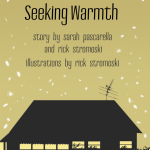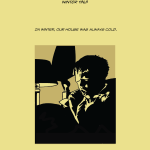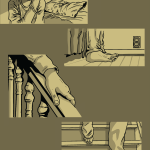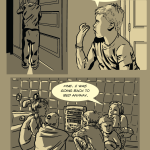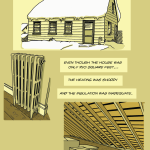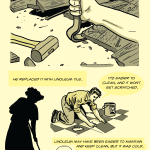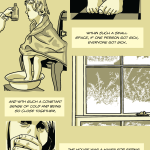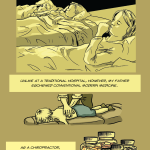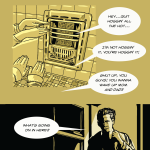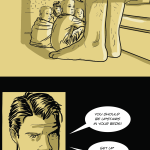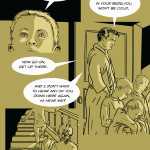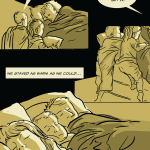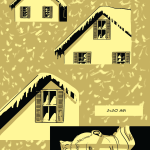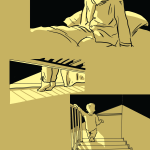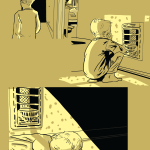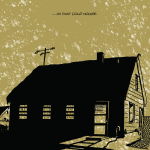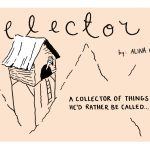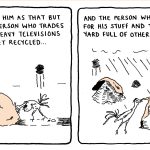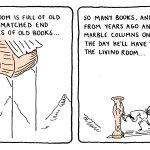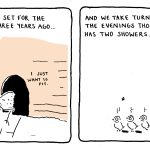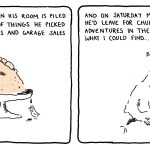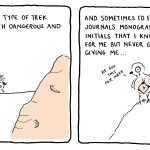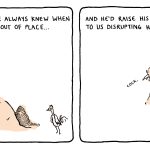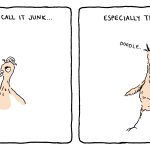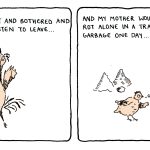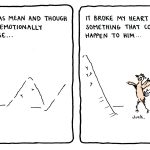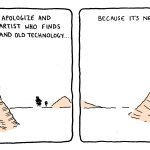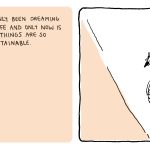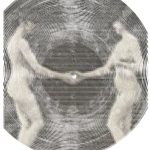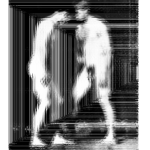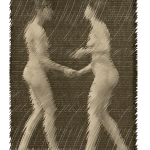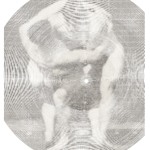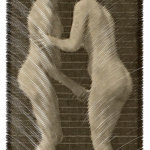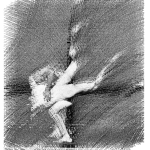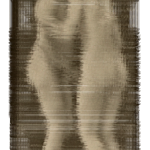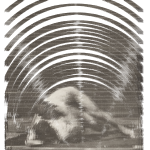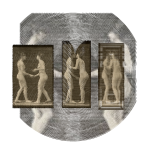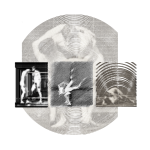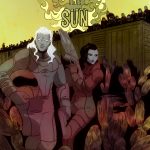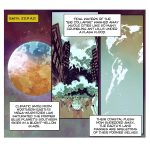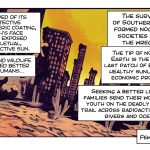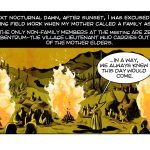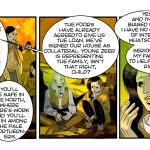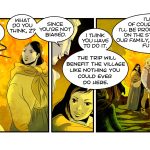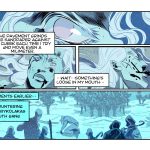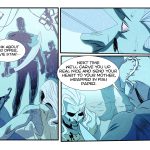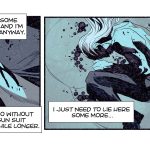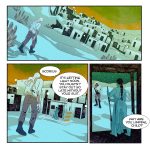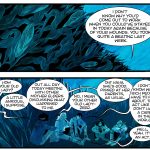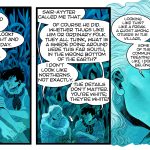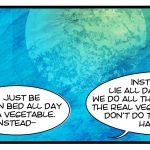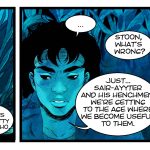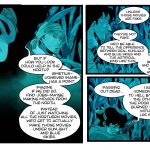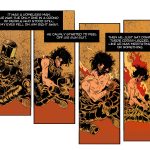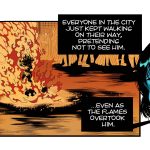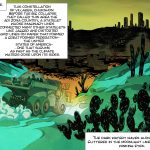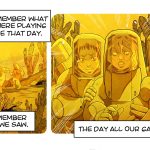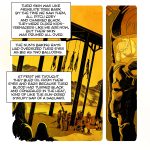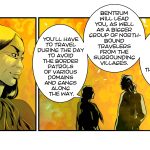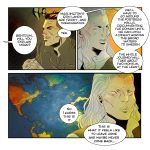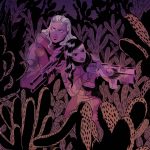When I’m watching the street fill up with leaves when dusk morphs
to a waxy flickering to a phone pinging dad I’m inside this bar
I’m line dancing I’m filled with holes for the man with the Glock
releasing the safety must be orgasmic and a background check
equals emasculate one day is like another and then it’s another
school café yoga studio church another concert hall another
outdoor space for cold bodies quiet like a pile of unlucky armadillos
when a friend arrived two days before the one at the synagogue
when he said I have a right to carry to sleep with it to fuck it
the pasta went from hearty to heart riot though I wanted to handshake
a civil understanding on the footprints leading to a glowworm cave
of mourners to the police officers’ eyes the line dance toward
the hearse that my pain string was taut that our country’s pain string
is taut that our country is electric like a frying pan with a frayed cord
always a fray away from fire
Category: Literary Features
Two Poems with Parents
Sleeping in My Childhood Bedroom as an Adult
Glow in the dark stars tumble
into black, their light hanging
like the feet
of a man tied to death. I trace
the outlines of memories and pull them
to my nose, they smell like
patchouli and my father’s
velvet coat. Gray shapes
dance to the window. Are they
the ghosts of my dead dogs
or the angels I overheard
my mother asking for help? Or maybe just
teenage headlights, sneaking back into their parents’
driveway. The laundry
room moans and shakes
behind a poster
of New York City’s face. The dryer thumps
against my wall. Round
round round. Clothes rise
and fall
like the air lifting up my chest. My mother’s
Elvis T-shirt. My father’s white
briefs. The noise goes
in circles. Up
and down. Taped on the fridge
is a photo dated two
days after my birth. My mother is holding
my head to her chest, my feet swing above
Elvis’s bleached teeth. And I still remember
my father
getting nervous and shouting
and shutting
the door when my brother and I found
him in his white briefs. Rise
and fall. I focus on the dark
and the noise and the clothes
that make the
dark warm. Up
and down.
Rise
and fall. Round
round round.
Sitting in a Classroom Where Everyone Is Smarter Than Me (Except Maybe That Guy with the Taco Tattoo)
I want to pull my knees to my chest
and make myself small and see
through like the balled-up sheets
of cling wrap I find in the drawers of my mother’s
kitchen. But I don’t do that
because I wouldn’t be small
or see through to the people
sitting across the table. They would still see
a girl with uncombed hair
wearing a baggy t-shirt she got free from a bank
because she never learned
how to not be ashamed
of her breasts. And they might find it strange
if this girl slipped her feet from
the mud-painted rainboots
that keep her weighted
to the government-bought linoleum,
and then if she pulled
her feet and the hand-knit socks
that held them up to the seat of her chair,
and what if her neck let go
so that her forehead sat balanced between
the tops of her knees.
Yes, that would look strange.
Instead I move my left thigh
over my right and tie my calves
into a knot. I can’t see
my legs beneath the table
but I imagine them as the twisted strings
of green and pink
taffy my father pulled from his suitcase
whenever he was afraid
that he’d been gone
for too long. Throw away
your wrappers, he told me. My mother yelled
when she found them
rolled into worlds
and tucked inside
the corners of kitchen drawers.
Two Poems
Once when I was eight
and my sister seven, tensions boiled over
in a game of hide & seek
& I slapped her. Thwack.
Her head shook while streams on her cheek
loamed into deepening red.
She didn’t talk to me for a week.
No chocolates, no sorry, no nothing.
I even did her homework for a day. Still nothing.
She finally spoke when she found me
crying in a corner after India had lost a cricket match.
Today, years later she isn’t picking up my calls
& I’m here wondering if she’s busy
or simply pissed with me.
I haven’t seen her in long & in this hour of prolonged dusk,
I’m trying to summon facts on her.
But as I pace on my balcony, phone in hand,
watched by a sun rasping blood across a browning sky
all I gather is the colour of her slapped cheek.
And how on reconciliation after a week, she had said
I just wanted to see you cry.
Sambar on my shoes
I spot you in the cafeteria sitting with a faceless stranger
while I await my dosa at the desolate counter
you sip what seems like watermelon juice although
I’m sure my blood is just as gruesome and thick
that must be how your cheeks are so red and faint
like blushes of sky at dawn attracting birds of fury
and strangeness unknown I see some wrens beak you playfully
the crimson spreads through your neck like a field of clover
the stranger inundated with anticipation he crosses his legs
underneath the table when you let out a laugh
I head back to work my appetite punctured my spirit flensed
my dosa tray trembles in the tremors of discovery
buried fears don’t nibble they swallow
I try to tell myself it was probably someone else
but I find incriminating evidence when my colleague points out
continents of sambar on my white converse shoes
Among Schoolchildren
Like a cormorant turning on the wind before tucking its wings and descending into the ocean, my mother, five days a week for forty years of her life, submerged herself in the primary schools of small-town Texas, each brick or stucco campus at which she worked named for a hero of the Alamo: Travis, Crocket, Bowie, and Bonham, garrisons of the alphabet and basic arithmetic—crumbling and underfunded missions all.
As the school’s lone counselor, my mother traveled from classroom to classroom, her materials piled on a Rubbermaid cart as if she were a vaudevillian or ventriloquist, boxes and suitcases filled with dolphin puppets, marionettes of creatures from the sea, and stuffed-animal pirates, each one with an accompanying picture book to teach children about difference and compassion.
Abandonment was the fear that trumped all others, and the children carried it always, the fear dissipating only at the sight of a father’s arrival, or spreading like a fever at the close of the school day when a mother was not readily seen.
How deeply the children sank into worry, withdrawing into hooded sweatshirts like miniature monks, or carving row upon row into their desktops with the tip of an inkless pen.
To be sure, the children had cause to worry.
Parents deployed to Kuwait, Iraq, and Afghanistan, and though most returned to the Air Force base on the city limit line, some did not: the brother ambushed in a sandstorm at night, a father’s helicopter losing sight of the ground, a mother’s Jeep triggering an IED.
There were the domestic and financial worries as well, and my mother scrounged shoes for the shoeless and glasses for the sightless, arranged pro bono visits from doctors, marriage counselors, custody advocates, and lawyers.
Each Friday, she filled backpacks with nonperishables for the poorest children to take home for the weekend, without which they would have nothing to eat, the great isolation of hunger, each child, not adrift for days, but helpless, inert, a boulder in a river around which all water flows.
For loneliness, consider the third grader born without cheekbones, a shrunken jaw, Treacher Collins syndrome, who met with my mother when a surgeon was found to perform a procedure in Dallas for free.
The recovery required that a helmet be worn for weeks to secure her features like clay dredged from a riverbed to dry in the sun. The young girl’s concern was not the surgery but the wearing of the helmet, conspicuous to all.
A deal was struck, and when the girl arrived back at the school, my mother was wearing a helmet as well. Other teachers and students joined in, and for two months all manner of headgear—whether bicycle, beanie, lacrosse, or hockey—bobbed through the halls.
Like Janus, the Roman god with counter-gazing faces, the god of new beginnings and transitions, the children relied at all times (naively, stubbornly, irrespective of evidence) on hope. Each six-week block, each promotion in grade, was a chance to start again, and if hope flickered and dimmed like a struck match, their final refuge was laughter.
When the vice-principal, svelte as an offensive tackle for the Houston Oilers, the muscles of her right forearm hard as an ox’s neck from swinging a hole-bored hickory paddle (in a time before spanking was banned from public schools), tucked her mohair skirt by accident into the rear of her floral-print underpants and inadvertently promenaded through the hall, the laughter, shrill and instantaneous as the city’s lone tornado siren, overwhelmed the vice-principal’s calls for order so that, red-faced, defeated, she was left with no choice but to skulk to her office and brood.
The pièce de résistance (French, spoken with a Texas accent, could peel paint from the Eiffel Tower itself, and for two semesters in high school an English teacher referenced the “Bore-gē-OH-ēs,” the word seared in my mind until, in a Marx Brothers movie, I heard Groucho correctly pronounce “bourgeois”) was the story my mother told about puberty education, how, on one day every school year, the fourth-grade boys were sent en masse to the cafetorium as the girls retired together to the gym.
Television stands with VCRs were wheeled down from the A/V closet, and for forty-five horrifying yet fascinating minutes, as the teachers popped in the tapes and slipped out for a smoke, the children suffered a barrage of gender-specific information from menstruation to dropping testicles, body hair to voice cracks.
On one such appointed day, my mother heard shrieking from the cafetorium and gym at once, and as she rose from her desk, a teacher ran through the hall, her just-lit cigarette trailing smoke from her undulating hand like a priest swinging incense.
“The tapes are switched!” the woman yelled. “The students are watching the wrong tapes!” as the vice-principal, gopher-like, peered out from behind her office door.
In the end, parents had to be called, and though no explanation would fully suffice, the secretary (who got stuck making the calls) offered only a shrug and a halfhearted, “They would have learned about it all sooner or later.”
The one indisputable truth about children is that they grow into adults where personality, instead of evolving, calcifies.
“Joey! We taught you better than that!” my mother, sitting at the kitchen table, would exclaim and slap her hand down on the newspaper article she was reading when a now-adult student was apprehended for robbing a convenience store or absconding with a neighbor’s car.
For my mother, the adult was never severable from the child, which became the measure of her work. Student replaced student each year until, at last in retirement, the progression, like the volley of soldiers against the walls of the Alamo, subsided.
I shall never retreat, Lieutenant Colonel Travis wrote in his final hours. Victory or Death—the scene reenacted each year in the spring while the teachers mouthed lines to the costumed martyrs, and their parents, knowledgeable of history and fleeting time, raised cameras and tripods like bugles and swords.
No Problem, Mon: The Batty Boy Adolescent’s Quick Survival Guide
Become a Christian
There is no exception. When Grandma’s getting ready for church tomorrow, tug at her skirt hem and say Grandma, I want to come to church too. She’ll scowl. She’ll remind you that Big Reds said the same thing five years ago, but now he sleeps in every Sunday and had that seizure the other day from smoking weed. Stand your ground. Point out that you’re nothing like your brother, and that it’s her Christian duty to set you on the path of righteousness. She’ll smile. She’ll call you a mouthy little bitch.
Stick with it. Go to church every Sunday. Every Sunday. Starch your white shirt. Press neat creases into your wool slacks. Save any little money you have for the collection plate and cherish the pocket-sized New Testament she’d originally given to Big Reds. On the bus ride to town, ignore the other kids. Sit by your grandma and assume the stoicism of a proud martyr. This means no complaining about: the holes in the bus floor, the rents in the bus seats, the heat pressing in from all sides. Sweat will run into your eyes and pool beneath your butt. But Jesus endured much worse on the cross, so keep quiet.
Don’t Make Friends
Okay, this is a two-parter. So first off, don’t make friends with the kids at church. I know this is tempting; church is so damn boring (can you believe it? Jamaica in 1998, and part of Holy Trinity’s church service is still in Latin), and these kids, they’ll want you to catch butterflies with them at first, out back, in the churchyard, ’round where the tombstones are. It’s a trap. They’ll grow eventually (well, the girls you’ll witness — the boys will start to disappear around 13). They’ll grow somber, like those heavyset women in church with the lining of their slip always dipping below their skirt. They’ll start to wear blouses that button at the neck, and fasten their hair in no-nonsense plaits. They’ll start to invite you to summer retreats and choir practices and, when you politely decline, exhale gasps of frightened outrage that seem way too heavy for their flat chest. You’re not here for all that work. So just keep to yourself from the outset. Sit by your grandma and shake hands with the ladies and the old men as they walk by.
When your grandma dies (terrible loss, really), you can ditch that fancy church in Kingston and go to one in your own area. Don’t go to one in your direct neighborhood, though — go to one on the other side of the gully where the roads are less formal (snaking through bushes) and the houses have a delicious ad hoc quality to them — zinced and planked and set atop cinder blocks. Notice how the roof of this church is flat. Notice how the windows aren’t stained. Notice how the floor is dirty, how the walls are bare and how the pews aren’t pews but fold-up chairs. Notice how the women here jump and wail and mash their faces into foregone ecstasy. Notice how, no matter what church you go to, the preacher’s son is always tall and square-jawed and smiling at you in a way that makes you wonder if there’s anywhere Satan doesn’t have a house.
Speaking of your hometown, this brings us to part two of this section: don’t make friends with the other boys in your neighborhood. That’s asking for trouble. Eventually, they grow into teenagers and confront the futility of trying to make it anywhere. They never know their fathers, and they never make it past the tenth grade. They spend time under the lampposts, by the gully bank, against the old trailer, slapping dominoes, shooting dice, slipping their hands under their girlfriends’ skirts. They’ll want to pull you in on it too. Seal the bands of brotherhood. The Christian defense won’t work here. They’re too basic, too disaffected. My yute, you doh see di girl a check fi yuh? Why yaa act like a pussy?
Trust me. Way too risky. Best to stay inside at all times. Except when you have to go to school, of course. Your mother will send you to good schools in Kingston, far away from the locals. That’s good. After school, when you get off the town bus, head straight home. People will call to you. They’ll say Brown Boy or Scholar or Preacher. It will be out of deference. They’ll admire your discipline. Still, don’t call back to them. Nod politely or smile. Sometimes you can hold up a hand in acknowledgement. Carry around your bible for good measure too. They know you go to church, but it’s good to reinforce this every once in a while.
Keep up at your studies. Otherwise, you won’t have an excuse to stay indoors. Your mother will begin to think it unnatural that a boy is spending all his time in front of a television, atrophying his muscles, neutering his presence. Studying is an excellent pretext. It assures her you’re determined to make the best of her sacrifices. It buys you some good bonding time with her too. She’ll bring you milk sometimes, a whole glass. She’ll put her arms around you. She’ll say you’re nothing like your brother (Big Reds’ been disappearing for days at a time now) and squeeze a little harder. You’ll feel her lips on the top of your head. You’ll remember how soft they feel pressing against your skull. You’ll wonder when will be the last time she holds you like this.
Avoid All Types of Playing Fields
This might seem random, but it’s worth noting. Whether cricket or football or basketball, they’re all the same — trouble. This won’t be a problem where your schools are in Kingston; all the playing areas are walled off and/or privatized. In your hometown, though, they’re plentiful, cropping up in dubious makeshift forms in the most inconvenient places. Be vigilant. Keep abreast of the changes in landscape and avoid the main thoroughfares. Playing fields line them. I know it’s tempting to watch the boys at play, but you’ll thank me. What do you think will happen when a ball comes your way? Don’t think it won’t happen, ’cause it will. And those men, the ones you like to watch, will lean on their haunches and heave at the air, expecting you to throw it back. And, bless your heart, you’ll try, but your throw will go awry (your wrist — always a bit too theatrical). Or you’ll try to kick it back, concentrating with all your might on lining up the ball with the plate of your foot, but the ball sails wild. It goes clear over the light wires onto a rooftop or across the gully into the bushes — it will go everywhere but straight (Tee hee). The men will laugh. They’ll call you skettel, Shelly-Ann or Big Reds’ likkle sister. They’ll ask you what color panty you prefer. Even though it’s in good fun, it’ll hurt. You’ll develop an ironic fear of balls.
On your walks home, best to take the long way through the back roads. Through the flimsy dirt lanes webbing through the groves and wild grass that cordon the town. Buck up, though; you’ll make a friend. His name is Mr. Turner and he’s a sweet old man. Grey sideburns dip from his bald head and line his weirdly smooth face. But he has such nice brown eyes, bright balls of coppery brown eyes. He lives in one of those wobbly wood shacks that crop up by the back lanes like monstrous weeds.
He’ll call you over one day and offer you butterscotch. You’ll notice his house is not as ugly as the others; it’s a confident little wood square set atop slabs of concrete. And, look, he has a little garden to one side — bright bunches of cherry bougainvilleas dripping from a trellis of a fence. He’ll be sitting in a small wicker chair behind his front grill, the inside of his house dark behind him. He’ll tell you how you look like his grandson, who’s also about seven, and offer you butterscotch candy in a yellow-gold wrapper. You’ll start taking that lane regularly; you’ll tell him about your day at school in exchange for candy. When you get a little older, he’ll start giving you plantain tarts and little patties he baked himself; he’ll tell you about the daughter he hasn’t seen since his divorce thirty-odd years ago. She’s about forty now and has a son whom he’s only seen in a few pictures she’s sent. You look so much like his grandson, he’ll say; he’s probably growing a beard too. You’re curious; you didn’t even realize you were growing a beard. Come here, he’ll say, you’re growing some fine little hairs. He’ll reach his hand through the grill and you’ll move close. He’ll sweep the line of your jaw with a shaking finger. Are those really baby hairs? you wonder. Or is his hand that coarse?
When you go back the next day, he won’t have any patties for you. His spatula fell behind the stove and his hands are too big to reach back there. Do you think you could reach back there and get it for him? He’ll ask to see your hand. He won’t be smiling. Still you consent, and he’ll grab your wrist with a strength you didn’t know he had. Will you come and help me? he’ll say. His grip is hard, but his face is as still as dead water. You nod, holding his eyes with yours. He tightens his grip; his eyes are balls of thunder in the dark. Yes, you say again, and tick your mouth into smile. When he lets go to open the grill, run! Dart straight through the fever grass — tall, sticky fever grass slapping your wrists and scratching your neck. Cut into the burned-out clearing, then dash through the field of wild bush they call Deadman’s Fall. Jump the gully. Keep running. Keep running. Run until you reach the guinep tree at the top of the hill that overlooks the Fall. Take a breath. Drop your book bag and take a breath. Laugh, boy, laugh. Throw your teeth to the sky and laugh.
You’re such a tease, you’ll think to yourself. You’re such a motherfuckin’ tease.
Make Up a Girlfriend
Yes, that’s right. When you’re in high school, you’ll want to make up a girlfriend. Your classmates are from a different type of environment from yours. Their houses have carports, and they use summer as a verb. Thankfully, they’ll have some amount of decorum. They’ll not expect you to share sex stories, as they know you can quote Ephesians. Still, being Christian doesn’t exempt you from having a girlfriend. It’s convenient to make one up. So here goes: Her name is Rachel. She goes to your church in your hometown, and her favorite show is Step by Step. If they ask why you never bring her to one of the formals, just say that Kingston frightens her. They’ll believe you.
Be sure to have more interesting tidbits about Rachel so that she sounds like a human being. Keep cryptic notes on the inside cover of Wuthering Heights at home. Things like: R was born on May 6, 1988. R likes pink hibiscuses. R does not get the appeal of video games but has a brother who plays constantly so doesn’t mind it so much. In the unlikely event that your older brother (he’ll be back from jail around now) finds these notes on the inside cover of your book, tell him they are notes you’ve made on the novel’s protagonist, Romeo. He’ll believe you.
Near Final Note
All this work is wearying I know, but think, an American college is right around the corner. And I swear to you, there, you will have reached the promise land. There are, of course, practical matters of concern — Where do you do SATs in Jamaica? — Where are the American college applications? — What is your story? And how do you craft that into a compelling narrative? — Do foreigners qualify for need-based aid? What’s your mother’s salary like in US currency?
Daunting? No doubt. But now that the exit is so close you get to indulge in a bit of fantasy as a reward. Actually, it will be a good form of motivation. That’s right! You can finally start to imagine what type of boyfriend you’re going to have. Can you believe it!? B.O.Y.F.R.I.E.N.D.
Okay, so let’s see, he’s going to be your roommate — tall, broad shouldered, athletic build but not too hard. Blond hair, parted bangs and a baby face with a smile so earnest you’ll be convinced he still drinks milk with dinner. Hey! He’ll look just like James Van Der Beek. Yes! And he’ll wear flannel, and be from some outside-sounding place like Montana. He’d have played football in high school and, like you, had to work very hard to bury his difference. You’ll realize he likes it when you mistake American football terms. He doesn’t get to correct you often, so you give him this opportunity. “Oh my god, it’s end zone not field zone!” He’ll find this ignorance charming, and sometimes chuck you on the shoulder. He likes your accent too. You’ll sometimes catch him mouthing a word you’d just said, slightly in awe. And that is how it will happen, in the dark of your dorm room one night. You’ll both be sitting up in his bed against the wall, your head rested on his shoulder, his arms scooped around your back. It doesn’t matter how you got there, just know you’ll both be slightly drunk. He wants to know how you say ‘hello’ in Jamaican. Hello. And now he wants to know how to say ‘what’s up.’ Whaa gwaan. Whaa gwaan…he’ll contemplate it in a heavy whisper, gently rubbing the curve of your side. Your hand is now across the barrel of his chest, and you’ll marvel at the contained force of his heat. And even more, you’ll marvel at the exquisite realization that you’ve finally found your first friend.
The Return Home
So this is where I take my leave (for further tips on navigating the complex identity issues related to race and alienation within the American queer scene, please see Yes I Lacan: Dislodging the Pane of the White Gays”). But before I go, just a word about your return trip to Jamaica: don’t bother with the coming out thing. This trip won’t be about you. Plus, your mom will be in a weird space with Big Reds’ death and all. She’ll look different when you see her, inching instead of walking, and her eyes will have sunken in. There’s something unmoored about her — this wild hair and rumpled skin. Was your mother always this ugly?
There’ll be no words between you. She’ll squeeze your wrist and turn to the cab then stay silent on her side of the back seat. Her hair used to be sleek and jet black, and her nails were always polished in a ripened pink like the insides of a guava. But her hands look cracked and dead now. You’ll think to take one of hers into yours, but what kind of a gesture is that after 15 years? No, better to think about the flurry of e-mails Big Reds had been sending you, the ones that would be irritants before his disappearance and a torment after: Hey bro, how are you?; hey bro, do you think you could help me with something?; I promise I’ll pay you back; How’s teaching going?; Please, I wouldn’t ask if it wasn’t serious; Hope you’re well, bro; Let me know when we can talk. Consider that he probably begged your mom for help too. Ponder the possibility that she ignored them as well.
As the cab turns out of the airport and onto the Palisadoes, it will hit you like a brick of cold that it happened here, somewhere in the crevices of this wiry road snaking through the ocean. Or maybe they didn’t do it here. Maybe they chopped your brother up elsewhere, loaded the parts in the trunk of his car and left it at the lip of the airport in a whip of theatrical irony. Well, that’s assuming Big Reds was trying to get away from something. And that’s assuming “they” knew what irony is anyway. Oh dear, look at you, trying to construct a narrative.
Look out at the city, across the maw of dark water to the clump of small buildings huddled by the waterfront. This is Kingston. There’re more buildings, you’ll remark.
Yeah, the Chinese, she’ll say.
When you move to hold her hand, she’ll stare back at you from the plane of another world.
Mum, how did this happen?
How you expect me to answer that, son?
Simple. Just tell me what you know.
Her mouth too looks old, limp in a mesh of wrinkles.
I don’t know what. Maybe it’s the IMF.
The IMF killed Big Reds?
She’ll shake her head, raking the air with the teeth of her tin-gray hair, and you’ll remember, you’ll remember, she had grown ugly right in front of you. She’ll be saying something about the murder rate and the state of emergency, but you’re trying to remember your mother as a pretty woman, when she used to kiss you on the head and her hair would fan about you like a sheet. Why did she stop doing that? Maybe it’s because you stiffened when she started growing ugly. When was that? Maybe when grandma died. All her powders and creams had disappeared around then. Or maybe it was around high school; there was talk about her hairdresser money going to your monthly lab fees.
She’ll be talking about some riots. Do you remember the riots after the Free Zone got shut down? You won’t remember any riots. You’re trying to remember your mother’s hands, the way you witnessed them putrefy because of the clothes washing she started doing on the weekends. Whose clothes were they? It hadn’t concerned you to ask. But the money you remember going to Big Reds’ first bail because of…the riots?
Was Big Reds in the riots?
She’ll look at you, concerned.
No baby, Big Reds wasn’t in the riots. He’d already moved to MoBay, trying to find another job. Remember?
Why can’t I remember any of this? You’ll ask.
Maybe you were focused on the wrong things, she’ll say.
Wedding Season
Free again, my panther
life takes off fast—palmettos
and snakes in the path.
The beautiful sea grape
is aging like it’s winter;
leaves of talkative platters,
some big as my hand, still
grow heart-red veins
but have gone soft
and pale at the edges.
My very last husband
sheds his brave persona
and slithers into the bamboo
for good. Leaving
him there, I remember
that on nights like this,
thousands of baby
sea turtles hatch
and make their determined
way to the water. Life
goes on, the planet sings,
unaware of all our betrayals.
The waves swell
and collapse. I hear
the corks and lantern-lit
shouts of new wedding
feasts all over this ringing
world. If champagne comes
in midnight blue, I’ll toast
their tight bouquets of joy
as clouds bubble
against the sky in
their incessant kissing
with the moon.
Glowing sand pushes
up from every step
like sifted white
hills of cake flour,
the only light for miles.
Please also see Russ Kesler’s review of Susan Lilley’s book Venus in Retrograde, in which this poem later appeared.
Salvaging Beauty
(for Alan)
Peonies are blooming
to the point of collapse.
They lean into each other
with nothing to say.
Gracing lawn and stones,
thousands of fragrant petals,
extravagant as wings
relinquished.
To make final bouquets, I take
every flower that does not dissolve
at touch—late blooms, buds
surrounding first display—
pinks, bold and blushed;
shameless yellow;
white, center-stained
with crimson.
Every vase chipped
or cracked I fill;
vases on every table
in the house. I leave
the lawn scattered
with petals and stems.
I wait for the scent
of this dying
beauty.
Seeking Warmth
Natural Order
I’m a little more prairie than you, Mom.
Grew up a stone’s throw from winding,
forested trails. Trees arched over gravel
roads, and the place in the powder sky
where their branches met, a cathedral ceiling.
You buried downed birds in shallow graves,
in a vacant lot by your apartment. I watched
a whole deer decompose in a field. Made a school
project of her. Every quarter, on my class trip
to buckthorn country, to the task of weeding-out
invasive plant species, I saw the same doe
sink deeper into the ground. Drew her outline
on a worksheet more and more skeletal
with each visit to her muddy bedside. Mom,
you too have watched the seasons change.
Your childhood rotted into caretaking,
like a sun-bleached cordgrass giving
its whole self back to the ground.
When you were seven, you started buying
the family’s groceries each week—
cans of beans stacked in a bike basket,
cradled by cornstarch and white flour.
In elementary school, all my teachers
had the same four-pronged chart
of the seasons: spring turned
summer, then a gentle decline
into fall and a snowman
smiling through winter.
Nothing in nature actually follows
this pattern. A field mouse breeds
too many young, swallows
half of them back into herself.
When God Is a Woman
Monads and the Cosmic Jigsaw Factory
My scientist friend—his name’s Adam but he spells it “Atom”— calls me about the latest breakthrough. He says physicists have discovered a new subatomic particle. His voice is urgent, almost cracking.
I say, “I’m tired of spheres. Tell me this new particle is noodle-shaped.”
He says, “Monads, they’re called monads. They don’t have a shape, but they might have a soul.”
I’m no conspiracy theorist. Still, sometimes I get the suspicion that the scientific community is really a secret society of comedians who get a kick—a 2,500 year-old kick—out of human credulity.
Atom is out of breath. He says he has to go, but he’ll keep me updated. He makes it sound like he’s right there, in the midst of the action, his hands touching the lever of a particle accelerator, his eyes obscured by fancy goggles. I use the word “scientist” somewhat liberally. Atom teaches AP Physics at a charter school.
*
When my wife and I were still doing marriage counseling (a year before our divorce), Atom was full of suggestions. He kept championing the need for proximity. He’d call me up and say, “Are you close? I mean, you know, close?” He’d suggest that my wife and I take a sample of each other’s blood and put the samples under a compound microscope, and then—as husband and wife—spend time marveling at the shifting landscape within, how each drop of our blood was a unique eruption of lentil-shaped lava.
On some level, I think he was right. My wife and I were failing because we had run out of topography.
*
The next day, Atom calls up again. This time, I stop him mid-sentence and say, “Soul? I think I misheard you yesterday—did you say monads have souls?”
He says, “It’s complicated. At the very least, monads have perception. Not to mention appetite—”
“Jesus, they get hungry?”
“More like inclination. Or desire. They long.”
There’s a lull on the phone. On Atom’s end of the receiver, I can hear clinking glasses and a droning electronic voice, as if Atom’s at happy hour with Stephen Hawking.
I say, “Look, it just doesn’t sound very, uh, scientific—”
“What?”
“All these metaphors.”
“Actually, at the subatomic level, nonidentity is the norm. Nothing is what it seems, and thus metaphors are the most accurate form of language we physicists have at our disposal—”
Atom’s voice is drowned out by cheering, even wild abandon. Wherever he is, it sounds like a team has just scored.
I say, “So, uh, what do they want?”
Atom says, “Who?”
“Monads.”
“Omniscience.”
*
To be fair, it’s not just Atom who’s monad-struck. All the media outlets—NPR, CNN, FOX, even ESPN—can’t get enough. Monads this, monads that. Despite being infinitesimal, monads are bigger than sliced bread. The title of one article reads, “Sentient Particle Added to Our Subatomic Zoo!” Oddly, it’s not the first time I’ve heard the whole zoo analogy. After my wife and I split, Atom wouldn’t shut up about quarks and leptons and gluons and all those other subatomic “animals” that escaped from the primordial zoo.
Atom said, “The Big Bang was the first prison break.”
I said, “You’re mixing your metaphors.”
He said, “Imagine how many inmates we’ve yet to tag.”
It dawned on me later that Atom was talking about women. Other women. Soul-bonding with particles that were not my wife.
*
Atom keeps calling. Sometimes I wonder if I’m Atom’s only friend. He strikes me as the kind of person who believes friendship is monogamous.
He says, “The perception of monads is directed inward, not outward.”
I say, “Omniscience—I don’t understand—how does a particle seek omniscience?”
“Monads are navel-gazers. Each monad is like a piece in a jigsaw puzzle: its own existence belies the contours of its neighbors. Thus in studying its own being, each monad is in fact intuiting its cosmic neighborhood.”
Atom goes on to describe how monads understand the world concentrically. Monads reason from self to neighborhood to neighborhood’s neighborhood, etcetera.
It all sounds a bit alarming. Like an invasion. Minus the green humanoids with laser beams.
*
I rub my eyes into the wee hours of the night. Everything is out of focus except negative space. A hat suggests a head. An outlet, a plug. Contours become clues. I imagine my body as one gangly, oversized monad: it too is a jigsaw piece with a shape that suggests a connection. What connection? I only know the answers that are incorrect. All the hands I thought my hands fit into.
You get this sinking feeling when you turn forty—alone forty, divorced forty, table-for-one forty—you get this sinking feeling that the cosmic jigsaw factory made a mistake. A manufacturing error. Honestly, I think Atom knows this feeling all too well. I think it’s why he won’t stop calling. The cosmic jigsaw factory expresses its deepest apologies. No one’s perfect, it says. But the truth is, well, how to put it? Your piece was shrink-wrapped in the wrong box.
The Collector
Rich Gold
Aquifer shares this story in conjunction with
Anna Levi’s visit to UCF on February 4, 2019, 7:30 p.m.,
Foxtail Coffee at the UCF Bookstore.
Please also see our interview with Levi.
This evening when I woke up, Chino was gone. Not a sight of him selling crack on Cow Head Road. There was something different about that morning. The rain came with rage in a vengeful way for the first time in two months. Force-ripe baby breadfruits dropped into the canals whenever the wind struck. Bedsheets slid off the lines straight into the muddy gutter. Some girls were woken up by the growls of the thunder and, one by one, they ran out the rooms with their half-naked selves to save their towels, panties, and bras off the clothing lines.
There were fifteen wooden and rusting galvanized-roof shacks in the yard of the brothel. Each room had a thick mattress on the checkered black-and-white linoleum floor; a small speaker box; a small lattice window; a small round mirrored ceramic face sink; a suitcase; a brass vase of dying red hibiscus flowers in the right corner of the floor; an aerosol spray of floral air-freshener; a roll of toilet paper on a shelf; and burgundy lace curtains all balled up in a knot to allow air to freshen up the rooms. Rainwater leaked through some of the roofs straight onto the mattresses.
Chino’s mother, Sita, property owner of the brothel, who lived in the same yard with us, came over, dragging a large blue tarpaulin, gasping for breath and occasionally spitting on the floor. Chickens ran towards her gluey mucus and they picked at it like grains. She dropped the tarpaulin in front of my bare feet, scratched her grey coolie hair, flickered thick white dandruff from her fingernails into the air, then she placed her left hand on her hip and pointed her right index finger in my face and said, “Look here gyal, just cover de place until this rain dry up and come see me after. Ah tired. Ah gone.”
Already soaked in the rain, I stared at her skinny madras bosie back slowly walking back to her jhoparee. I stared at her jutti pitching mud at the bottom of her yellow saree and I remembered Tasha, my childhood friend from Tacarigua who drowned in a well a day after she turned eight. I could see her in my mind running after a cow straight up to Kandahar Village on a rainy crusade day in August. I could never forget that day Tasha slipped on a blue tarpaulin in Tanty Lalee’s yard and buss her head. I couldn’t bear the memory of the tarpaulin that caused Tasha months of healing, so I took one hard look at it, then I walked away from it.
I grabbed a white pigtail bucket to catch the plopping rainwater that leaked from the edge of the galvanized roof. Water from the pipe was scarce. It came once or twice a week. Sometimes for days, not a drop of water in Chase Village. Chino, our pimp, often told us that the water company deliberately locked off our water supply to put pressure on him to shut down his business.
There were twenty-five of us living in the backyard shacks of the brothel. Three locals including me, and the rest were from Colombia, the Dominican Republic, Venezuela, and Martinique. Two girls had babies including me, and three other women had children. The babies and children all lived with Sita. My baby, Maria, was only nine months old and I didn’t know exactly who was her father. My baby didn’t look anything like me. She was a light-skinned, chubby-legged, Chinese-face, dougla-hair baby, and I was a mocha-skin, skinny girl with Afro hair. I remembered fucking a few men from an offshore company, but I just didn’t know which one was Maria’s father. I didn’t really care about her and sometimes I didn’t believe I had actually kept her. I left it up to Sita to look after her. Sita got money from the child welfare services for all the children she looked after, including mine. She knew how to scam the system.
Every day, some of the girls were transported to other brothels far away in the countryside, depending on their legal status. Most of them either left their babies behind with Sita or found a way to take their children for their family or friends in their home country to look after.
My best friend, Bella, a thirty-two-year-old Dominicana, had been living in the brothel since she was twenty-seven. Bella and I shared a small room at the back of the brothel. During the daytime, we were allowed to go out and make our own money. Bella and I worked two days a week peeling vegetables in a Chinese restaurant in San Fernando. One day a week Bella learnt English, and I had recently started taking maths lessons. The other days Bella, I, and some of the girls hustled on the marina in Chaguaramas, selling our cunts for pounds, US dollars, yen; any money that pass, we didn’t miss. Some of the girls took English lessons some days in the week to keep their legal status, while others took the risk to work in Chinese-owned variety stores. Chino often warned the girls about jobs that put them at risk of deportation. I was lucky because I was a local and could lie to save myself.
From 10:00 p.m. to 4:00 a.m., Chino owned us. Every man we fucked, he took and controlled our money. He fed everyone, sent us shopping whenever he felt like, paid for the girls’ legal status, tickets back and forth to their home country to drop off their babies, court charges. He was our fairy godfather. He had many friends in high places, but he wasn’t an easy man to deal with. He often gave us crack to kick off our night’s work and sometimes he’d beat us like he did the pit-bulls he trained. This is why for a long time, I have been considering running away from this place with or without my baby.
“Sonya, Sonya, where is Chino? Me no see Chino,” Bella inquired. She covered my head with her towel and dried my arms with her top.
“Ah doh care. Ask Sita, she know everything about she son,” I replied.
“You no care? Chino have me passport. If me no have passport, me no go no way?” said Bella, pointing at her chest and shaking her head with concern.
“Whey yuh going, Bella? There is no way tuh go right now. The police busted Copa Cabana, Miramar, and Ocean Spray last week. Yuh want tuh go tuh jail or get deported? Dem women in de jail will fuck yuh harder than ah man and yuh know what? Chino’s friends, dem is prison officers too. They go fuck yuh even harder if they know Chino owns you. Especially how yuh have sunflower eyes and yuh skin so soft and pink and yuh lips so thin and yuh hips so wide, and yuh hair so blonde, straight and long,” I warned her.
“Me no understand you. Chino what? What is da problem? Can you talk slow? You confuse me with Trini talk. You sound like you from Africa. You English is very, very bad!”
“Sita want tuh see meh fuh something Ah doh know yet. Come with meh nah? Maybe she know whey she son gone too,” I said slowly and I grabbed Bella’s hand to take her to Sita.
A long trail of violet periwinkle flowers separated Sita’s house from the brothel. Children who lived in the sawmill next door were sliding their asses in the mud, and some were racing after a bicycle tire around Sita’s jhoparee. Sita’s pothounds never liked me. They rushed me in the rain.
“Los perros think in he mind that you are ah fantasma,” said Bella and she picked up a few pebbles to pelt the dogs.
“Fantasma?” I asked twisting my confused face.
“Yea, it is something like ah dead person you cannot see. Ah! Like ah spirit,” she replied, clicking her fingers.
“Hahahah, that is ah scary way tuh see people,” I said.
“Me abuela would say that you are maldicion. Ah don’t know the word for it in English. But you need ah rosario then go to confesiones. You need to put on white clothing. You spirit, you life will be better. In me country, muchas people Catolicas. Is ah tradition. We love it,” she said waving her hand and smiling with happiness.
“I understand you. But I am not Catholic. The woman who Ah live with was ah Hindu like Sita. We have puja fuh bad spirit. Sita knows,” I replied.
Under the coconut tree in Sita’s yard, an open mandir with a statute of lord Shiva sat with folded legs on a cushioned fake lion. He was adorned as a lady with long golden mala earrings, a golden trishul firm in his left hand, green beaded bracelets around his wrist, a white lingam drawn on his forehead, a charming snake posed off on his bun-styled hair, and another vicious-looking snake around his blue neck. His lips were raspberry red and his fat cheeks were blushed up with rose. He held his right hand against his chest as if he was giving a pledge. I picked up a yellow buttercup flower on the slippery muddy floor, lit a coconut-soaked wick in a deya, and performed aarti, singing a bhajan:
Om Namah Shivaya, Har Har Bhole Namah Shivay,
Rameshwara Shiva Rameshwara, Hara Hara Bole Namah Shivay,
Ganga Dhara Shiva Ganga Dhara, Hara Hara Bole Namah Shivaya
Bella held onto the colored bamboo flags and waited for me in the rain. After I sang the mantra, she hurried me by my arm.
“Listen to me, Sonya,” she said. “Sita is ah bad woman.”
We walked through the rain and then up the few stairs of Sita’s jhoparee.
“No, she ain’t. Yuh should pray. I go teach yuh. He is Lord Shiva, he killing all evil,” I said.
“No! Me is Catolica. Me confess to San Basilio only! You like ah madness. Only think I like is that you God is ah man and he look like ah woman. She pretty lips, rojo. She man and she woman. Me like that. Eso es poder e igualdad para cada género. But snake on she body? Maligna! Sita esta loca! If me hungry? I will never eat from that crazy Sita. Loca. And you Sonya, you crazy too!”
Sita was sitting on a rocking chair feeding Maria sugar-water from a plastic baby bottle. Four children were sitting on the floor eating macaroni and ketchup and licking their fingers. Two boys were jumping from a table to the mattress. Bella took off her white cotton frilled top and beat the flies that buzzed around the children’s meal. Salina the red-eyed cat jumped on me, and I flung her on the balata window frame of the tapia house.
“Meow, meow, meow” Salina cried.
“You see, I know what I talk about. You need change you God,” Bella remonstrated.
Sita handed me Maria in a hurry, and I threw her into the air and kissed her all over her belly. Baby Maria’s skin was smooth like the milk Sita offered Lord Ganesh.
“She has a bad cold,” I said, listening to Maria’s rattling cough as she giggled “Ma ma, ma ma.”
“Ah just squeeze ah lime in she tea,” replied Sita.
“No! give she honey and vaporizer, no lime!” Bella persisted.
One of the children who were eating on the floor, a small boy with a swollen, malnourished belly, stood up to stare at us, chewing his thumb. Sita’s jhoparee contained three small bedrooms with seashell-printed shower curtains as doors, an open kitchen, and a littered living room. The dried grass from the clay-filled walls flew in the air whenever the fan breezed the wall. Lizards ran in and out of holes in the walls to catch spiders. There were a few plastic bottles of water under the kitchen sink. Baby cockroaches clambered out of a Styrofoam box, which contained Sita’s cold-storage food on a table in the center of the living room. Dried corn husks and strips of orange peel hung from the low palm grass ceiling of the jhoparee. The smell of soaked dhal filtered the air as if a sewer had been leaking underneath the house. Black and white photos of old folks and a colored baby photo of Chino licking ice cream on the beach were glued to the wall. A tall brown cardboard barrel with an address in Germany was used as a space saver. An electric kettle, coffee mugs, and Lipton teabags sat on a red-crocheted tablecloth on the top of the barrel. People’s names and addresses and phone numbers were scribbled all over the barrel.
Bella examined the colorful picture of Mother Lakshmi that sat on a pitch-oiled lamp near Sita’s rocking chair. When Sita lit a cigarette, Bella took it from her to finish it.
“Sita, me no see Chino all day. Where is Chino? We no have enough beers in de bar,” said Bella.
“Well this is why Ah wanted tuh see Sonya,” replied Sita and she got out of her rocking chair to make black coffee.
“What is da problem for Chino? This morning me have premonition for Chino. I see in me sonar, ah woman with ah gun. Me no understand that woman. Me never see she in me life. She look like ah Trini. Maybe it is you sister, Sonya. She look just like Sonya. Negra and tall and bonita. Big Afro hair! She and Chino have ah gun. Then me see ah white bird come and Chino go with de bird and I no sleep good after that,” continued Bella propping her head with her hand on Sita’s table.
“Ah doh have any sister, Bella! You make me so angry when yuh talk about family. I’m ah Nowherian. Sita should take you tuh she pundit to unfold yuh dream,” I replied, standing up to rock Maria to sleep.
“Well Ah get ah call from de police station and they say they have Chino in Remand Yard at de jail. They say they find Chino in Carlsen Field with a kilo of cocaine. And he have ah hearing next week Monday in Chaguanas Magistrate Court. And Ah doh have no money. I eh even get meh pension and de children welfare yet,” Sita paused with a worried look and she continued to weep, saying, “Before Chino father dead, he wanted tuh sell de bar inno. Ah shoulda sell de damn bar. But Ah feel sorry for de girls Chino trying tuh help. Yuh know? Chino doh sell coke! Somebody must be jealous of meh son because he used tuh make money from de bar. And these children Ah minding here, Ah get good people to take them, but Chino doh listen tuh nobody. Ah tired tell he tuh stop helping allyuh. Doh take in no more girls! Leh dem go back home tuh Venezuela and Santo Domingo or wherever he pick them up, on de street, Ah doh know! Ah just want back meh son and fuh he tuh change he life. Now he in jail and me eh have no money. Not ah cent. Ah cyah even buy tablet fuh meh diabetic foot. Oh God, they set up meh son. Chino doh trouble nobody.”
“I no understand,” said Bella and she raised her skirt to dry Sita’s tears.
“Chino is in carcel.” I explained to Bella.
“Chino what? I need me passport. I want get ah man to take me away from Rich Gold and he will help me go back to me country,” Bella boasted.
Maria held my neck tight. I felt her little heart pumping on my chest. I looked at myself in a mirror that was nailed to the balata wall frame, and I imaged what my birth mother looked like with me when I was her baby. I have never seen any pictures of myself as a child nor of my mother. I vaguely remember where I got that long deep scar over my eyebrows. It must have been my foster mother. She often beat the shit out of me and that is why I came to Chino.
Nobody told me I was pretty except for Bella. And that is why she is the only girl at the brothel my blood took. A woman who knew my real mother told me I smiled just like her. She also told me that my mother had a deep dimple in her cheek just like me. Some people from Kandahar Village told me that my mother died of pneumonia when I was six months old. Other people told me that my mother gave me away because she was on drugs. I never wanted a baby so young in my life, and I didn’t know if I really loved or wanted Maria. Sometimes I did. But I hated my mother for leaving me in the world like this. And I hated Chino for lying to us about our future. He didn’t care. Maybe my father was like Chino. I would do anything to leave this place.
“So this is what yuh want tuh tell me Sita? How can I help Chino? I can’t!” I replied and I shoved Maria into her hands.
“Ah woman from Rio Claro want tuh buy yuh baby from you. She can’t make babies,” said Sita, putting Maria down on a mattress on the living room floor.
“She buying meh baby? How much money she want tuh give meh?” I asked eagerly.
“How much yuh want?” Sita asked seriously.
Mosquitoes gathered around Maria’s head. Sita placed a net over her body and fanned her with a newspaper. I wondered what my daughter would become if I sold her or if she would be better off living with Sita. I didn’t know what to do with her.
“What yuh think, Bella? Ah doh know if de police go find meh. People everywhere already know ah make baby,” I worriedly asked.
“Just tell them de baby die,” replied Sita, shoving her saree between her legs and fanning Maria faster.
“Sonya, let me make ah confesion. Five years ago, me make baby. You know how I get to know Sita? Somebody bring me here, and Sita sell me baby to ah Trinidad woman who now live in Canada. She say she make baby at home in Trinidad and she get ah passport for de baby. Ah get some money and me baby go Canada with de woman to live. No problem! Baby will have ah better life. Baby will not forget you smell, you eyes, you skin. One day, baby will come back to you. I cry for my baby every day but I happy she is in a better life. Así es la vida. Da police no understand nothing in this country. Only for marijuana and cocaine. That is not police business. Okay? So take de money and give de baby away. You start ah new life. You are ah free woman!”
“Is she going to miss me?” I turned to Sita.
“No! she is going tuh miss me. Not you!” Sita pointed at herself.
“Okay, take my baby! Give de woman ah reasonable price. No!” I quickly changed my mind and declared, “Ah want ten thousand dollars. It’s enough fuh a visa and a ticket tuh start a new life in America.” I fantasized about shopping in America with a rich white man.
“If de woman come fuh Maria tonight, can I borrow de money tuh bail out Chino and he go give it back tuh you?” Sita was serious.
“Tonight? So soon?” I asked.
“Well, after midnight. It better Maria goes while she is asleep. When she get up, she won’t see me and she won’t know how she got there. She won’t remember anything,” Sita replied.
“Ah don’t trust Chino inno. That money is my only dream,” I replied.
“Our dream,” Bella insisted.
“Do you trust me? I’m not Chino!” Sita demanded. Her raccoon eyes looked dangerous, reminding me of the snake around Lord Shiva’s neck. The moles on her face made it look like a sour rough lemon. Her fat nose looked inflamed, red and swollen like Krusty the Clown.
“Take de baby, Sita! Call me when yuh have meh money,” I said and walked out the jhoparee in haste, leaving Bella with Sita.
“Do you want tuh go tuh America? Meh sister living in America inno. She is ah citizen. I can help yuh go tuh America.” Sita’s voice echoed behind me.
Later that night, Gloria and nine of us were sniffing hail, dancing to Yoskar Sarante’s La Noche, and dressing up for our night’s work in the garage.
“Where is Chino?” Gloria enquired, then she offered me a line of candy coca. After sniffing, I wanted to slap Paola for stealing my client when he came looking for me last Friday and she didn’t call me for him. I saw neon green lines walking past the room. I hugged my tattooed chest tightly and dropped my head on Gloria’s shoulder to gasp quietly for breath. My body went numb and for a few minutes I stood silently, thinking of Maria. The smell of Johnson’s baby powder and clean cotton diapers overwhelmed me. I realized that Sita was right. Maria would be better off sold or given away, and I could be a free woman in America.
“Chino always go to jail. He come back out and he gone again,” replied one of the girls as she rolled her fishnet stockings up her burnt legs.
“Me need me passport,” Bella said as she entered the garage.
“We don’t need passport. Me don’t want to go back home. There is nothing for me in Bogota. No more!” shouted Sandra.
“I want go back home. Mi mama sick and me miss me boyfriend. De men here not nice. De culture is loca. Me need freedom. No like work behind de kitchen, no like hide from police. Life no good here. Is ah racist country. Imigracion like money. No money, no extension. In me country we eat carne frita and chicharrones de pollo every day. I eat mucho curry and bbq in Trinidad. Curry everywhere! I need food from my country. From my mother!” said Bella, and she bent down to draw a line of candy coca for her stuffy nose.
The garage was a large secured space, situated beneath the brothel. We kept our personal belongings there. It was also our secret hiding place whenever the police came to raid. It had a gravel-camouflaged electric gate that locked us inside until we were dressed and ready for work at night. Wardrobes, cardboard boxes, plastic containers, and large blue rubbish bags were labeled with our nicknames.
After Betina painted my lips with her dark purple lipstick, she pulled out a pink bralette from her drawer and measured my tits.
“My god, you arm smell like ah ram goat,” she said, to the amusement of the other girls.
Sometimes we shared each other’s clothing, wigs, lace stockings, weaves, high heels, lipsticks, jewelry, and perfumes.
“Give it to me,” shouted Isabella, and she grabbed the bralette from Betina.
“No, yuh greedy bitch,” I replied, and I punched Isabella in the face.
When Isabella scraped my dark smooth face, I wanted to murder her. I pulled off her wig and choked her. Some of the girls screamed when Bella jumped in to help me punch Isabella some more.
Some of Isabella’s friends pulled me off her.
“You nothing but ugly n—! Nobody wants you!” Isabella cursed me.
When Sita heard the smashing sounds of beer bottles on the wall, she ran into the garage with two children holding on tight to the end of her saree.
“Yuh see wha happening here already? Ah fed up. Ah trying meh best tuh raise allyuh children and put dem in good homes and look how allyuh mashing up meh place,” quarreled Sita.
Hidden in the center of some of the mattresses that were spread on the floor, were unused condoms, packets of heroin, cocaine powder, and kush, rubber gloves, needles and syringes, packets of extra strength Panadol, bottles of sleeping pills, antibiotic pills, and an untouched diamond-black 9mm, seventeen-round pistol. Colombian, Venezuelan, and Dominican Republic flags fluttered from the ceiling as the fan recycled the dark eau de toilette air. Artificial silk flowered headwear wreaths, straw hats, and sunglasses adorned the white bald heads of Pinocchio-nose mannequins. Metal filigree masquerade masks, purple carnival beads, and a rosary hung around the neck and on top of the ivory white-veiled head of a statue of the praying Mother Mary standing in a corner. Half-burnt white candles lay at her feet. The small toilet and bathroom near the entrance were barely visible behind a montage of world maps and geometric-patterned Chinese fans.
Not all the girls came out that night. Some stayed in the garage either jacking up heroin or sick, rotting away in a locked, abandoned room Chino kept for the sick. Those who were working wore white mini-skirts cut right under our bottom, carnivalesque bras, thick high heels, and dark and bright-colored lipsticks, wigs. We often shared each other’s perfume—as long as it was cheap. We walked into the bar together, and the men, already drunk, were waiting for us. My handbag was packed with a bag of Xanax to put bad guys to sleep, a penknife, condoms, cigarettes, a lighter, and lubricating gel. Most of the guys liked fucking me in my ass, which I didn’t mind. In fact, I preferred it because they came faster and it paid more than a blowjob or anything else.
Chino’s right-hand man, Hawkeye, had been checking in a few part-time night workers, bartenders, and off-duty policemen. When the jukebox played bachata, a few of the girls did the mariposa dance on the rainbow-colored poles, which were surrounded by pool tables, slot machines, and chairs. Their legs opened wide as an ostrich opening its mouth. You could see their silk v-string thongs stuck tight in their vaginas and their hips grinding up and down the poles as men gaped hungrily, squeezing their balls and trying to figure out which one they wanted.
Bella came out of her room to tease the drinking men.
“Aye papi no lo hagas asi,” she shouted with a sign language to inform another girl to avoid a certain client because he was a cheap motherfucker.
In each bar room, there were mugshot photos of bandits who had robbed brothels in the village. We often looked at the photos to see if they matched our clients before negotiating price with them. I sat in room number three and recognized a regular client of mine. He wanted me again and knew how to follow me to my room in the back of Rich Gold.
My client preferred a dark room, and he didn’t like me looking at him. I knew he was a wealthy married, Muslim business owner from Point Fortin. Bella used to work for him. She used to babysit his children. Bella once told me he had fucked her, too. Each time he fucked me, I learnt something new about him. But this time he he had nothing to say to me. His long beard was shorter than usual, and his cold face looked like frozen salted prunes. When I undressed myself, he gently turned my face away from him and positioned my body in a back-shot posture. My head and the shape of my wig resembled Cleopatra in the shadow of the lattice window. The night pumped to the lyrics of La Noche:
En vano aliento mi rencor
Y espero el dia para odiar
La noche me hace recordar
Que no soy nada sin tu amor.
La noche
Me hace volver,
enloquecer.Enloquecer.
My client’s enlarged cock stuck firm into my vagina, and, as he pounded to the music, I thought about how much I missed Chino that night. My client fucked me nonstop until his sweat rinsed my spine. I looked back at him, and he warned me, “Don’t look at me!”
“It hurts!” I replied.
When I looked away again, through the window, I saw a strange woman walking out of the backyard carrying my baby and Sita behind her with a large cardboard box in her hands. There was nothing I could have done to stop Sita. Watching the woman and my baby leave, I wept in silence.
Glossary
Aarti: a Hindu religious ritual of workship.
Abuela: grandmother
Aye papi no lo hagas asi: daddy don’t do it that way
Bachata: popular music from the Dominican Republic, often associated with brothels
Bhajan: a devotional song in Hindi.
Bonita: pretty (female)
Candy Coca: a grade of cocaine/street name for cocaine
Carcel: jail
Carne frita: fried meat
Chicharrones de pollo: chicken cracklings
Deya: an oil lamp originating in India, usually made from clay, with a cotton wick dipped in ghee or coconut oil.
Dougla: a Caribbean Hindustani word for a person of mixed races (Afro-Indian descent)/illegitimate or bastard
Fantasma: ghost
Hail: a grade of cocaine/street name for cocaine
Jhoparee: a tapia house constructed from indigenous materials which include a mixture of forest lumber, leaves from palms/grasses and clay.
Jutti: Indian footwear (associated with royalty) made of leather and embroidery.
Kush: a high grade of marijuana.
Los perros: the dogs
Mala: prayer beads
Maldicion: blight
Malinga: bad/Evil
Mandir: Hindu temple
Mariposa: butterfly
Negra: a black woman of African descent
Nowherian: a person of no fixed place of abode
Puja: the act of worship in Hinduism
Jhandi: a common sight inside or outside the Hindu home situated next to a temple. It is usually made of bamboo poles and coloured flags. Each coloured flag represents a deity.
San Basilio: Saint Basil of Caesarea (Bishop, Confessor and Doctor of the Catholic/Anglican/Orthodox church)
Saree: a garment consisting of a length of cotton or silk elaborately draped around the body, traditionally worn by Indian and Asian women.
Sonar: dream
Trishul: a three-pronged weapon of Lord Shiva (Hindu mythology)
Some Trees: An Incidental Elegy
This essay was a finalist in the 2018 Editors’ Awards
competition here at The Florida Review. We’re proud
to present it here in Aquifer.
Let me be clear: I read the classifieds because I had nobody. Five or six years into the new century, I trudged through Southeast Portland, rented the upper level of a duplex across the street from a bar that served fried chicken all night and $1.75 domestics. I never cut back the ivy that crept all the way over the second floor windows, so the light in my room was always dim. In any case, the sky was invariably grey. The rain was less rain but fine mist.
In the mornings, I waited for the bus with the smell of yesterday’s oil in the fryers. I took the local newspaper from a dispenser outside the bar, then the same seat on the same bus every day. There were poems tacked above the windows as part of a citywide initiative to bring art closer to daily life. Each morning I read the same John Ashbery poem opposite my seat then opened the local newspaper and turned to the classifieds: the personal ads; items for sale or trade; miscellaneous services; missed connections. I never bought anything. I never replied. But I needed the idea that there were people on the other side. And the newspaper let me believe that even though I stayed so isolated. Other people existed, and as they existed they felt, and reached out with their advertisements. Not only did they exist but they were also alone and—since moved to action—maybe even more alone than I was.
Through these grey months, there is a single ad I remember most. It stood out among the used microwaves, gently worn tires, and everyday loneliness. It was exuberant. I could not believe it was real: a man, beneath a name eccentric and rich with consonants, offering formal pinball lessons at a location close to my duplex, and offering them in a tone ripe with awareness that these lessons were precisely what the world needed. “Master the flipper. Amaze your friends.” I tore the ad from the newspaper, circled it with a blue sharpie and tacked it on the fridge. I did not call. To call would invite the possibility that it wasn’t real. And I had to believe it was, that this person existed, offering his service at a time when all I could muster by way of invitation to the world was to drink too many $1.75 beers and in the morning peer into the semi-darkness through the windows of a bus.
—
A mile or so southwest of Fish Lake, Utah, there is a run of aspen more than 80,000 years old. The dendrologists have given it a name—Pando, from the Latin to mean “I spread.” Although Pando covers over one hundred acres and appears to be a forest containing a multitude of separate trees, it is in fact a single organism with a vast, interconnected root system, a clonal colony of Populus tremuloides or quaking aspen. Pando’s approximated mass of 13 million pounds lands it in the running to be the heaviest organism on the planet, and at 80,000 years old, very possibly the oldest. But even such an unfathomable lifespan may be an underestimation: some dendrologists argue that traditional aging techniques are inappropriate here and in fact Pando is closer to one million years old. One million years. I am thirty-eight. Yesterday I was looking at photographs from the early 1980s and felt a bodily dissonance between the world then and now. But Pando met existence in an era before human language and still exists today, adjacent to our sphere of depleted fossil fuels, snowballing automation, and deceit.
I keep saying “it,” but Pando is a “he.” This proliferation is the result of the asexual reproduction of a single male plant. It seems strange to me that such plurality could be contained in a male organism. I would immediately assume such capacity to be female, although it should be noted that in keeping with a cardinal condition of maleness, Pando has thrived and spread in the most favorable conditions possible. Geographic and climatic variations over the millennia have effectively wiped out competition from species of conifer or other younger aspen.
If there are degrees of solitude then Pando represents an exponential function. He may be prolific, but he is alone and—with only countless iterations of himself for company over thousands and thousands of years—compelled into an everted kind of introspection. It has been 10,000 years since Pando’s last successful flowering. The climate of central Utah is gradually warming, and, despite his monumental proclivity for survival, it has been agreed by the various dendrologists, environmentalists, and biologists that Pando is dying. The experts cannot be certain why. Grazing elk may have depleted new shoots and stems to replace the old. It could be the result of drought, of insect infestation. Or it could be that after multiple epochs, Pando has finally had enough. Regardless of the reason, without new growth the end is coming, and when it comes it could be sudden.
—
I am interested in impossible writing. As such I am interested in the plural text: how facing the impossible in language may necessitate and birth a text that dwells in the fractured amalgam of two or more known forms. I am interested in the new text that finds form in the aperture that this fracture creates: the text that becomes possible as the imprint of writing into the impossible. Such a work is realized through the multiplicitous capacity of that imprint, which is itself a function of the multiplicity inherent to language itself. Every word is a kaleidoscope of subjectivities, tamed by the socially determined conditions for its usage. The word was not complicit in this agreement. And words are not, by their nature, tame. To assume they are is dangerous. Every word maintains the radical potential for departure, and as such this potential for movement is retained by any sum of these parts. You cannot build a house of mirrors and not expect it to reflect the light.
So then a text that may appear in prose, in service to the form of the essay, may be constructed around an architecture more readily associated with poetry, containing further architectures beneath its surface, narratives that exist independent of the semantic value of the language. I mention this now because these are the ways a singular text might transcend its apparent plurality, how every word leads multiple lives in the air and on the page, and most importantly how a run of trees near a lake in Utah may indeed be the single oldest and most massive living organism on our planet.
This morning I flicked through images of Pando I found on the internet. Some had verses of scripture superimposed on the photographs. Others diagrammed the connection of each tree to its shared system of roots. Almost without exception, the photographs were taken in the annual interlude when the aspen leaves hang golden on pale boughs—that moment of transition, multiplied across acres of forest in singular association. I reread the poem I had read hundreds of times from my seat on the bus, John Ashbery’s “Some Trees.” Here it is again, today, opening in quiet triumph, moving through a quaking order into ordained stillness, deferring meaning toward a reality in which different perceptive realms are allowed to exist simultaneously. In each, the world is reborn: into the collapsed dimensions of space; a new desert music; the ramshackle frames we place upon time; the universe of the poem. “These are amazing: each / Joining a neighbor, as though speech / Were a still performance.”
—
Several years ago, at a time between the bus rides in Portland and my life here today, I went on a weekend training to become a hospice volunteer. I ascended an elevator to the fifth floor of the largest office building of an out-of-town business park and took my seat in a loose horseshoe of Formica trestles that opened onto a cheap-looking podium. A young woman stood in front of the podium and greeted each prospective volunteer with a cheerful nod. This disposition, complemented by her yellow pantsuit, suggested she was only stopping by en route to a less somber occasion, so much so that when she spoke I was disarmed by the soft attention in her voice. If we had been recently bereaved, she explained, we were encouraged to withdraw from this session and enroll at a later date. She did not specify how much later, how long grief might linger until it became manageable, until we felt able to move beneath it and perhaps take on some portion of the grief of others. Nevertheless, her message was clear: if you think this may be too much, it will be.
Morning sun cut through the Venetian blinds leaving a thatch of light and shade on the Formica. A man in navy plaid cleared his throat. His cat had died the previous weekend. The room mumbled condolence. Nobody left, though soon enough the cheerful woman surrendered the podium to a middle-aged chaplain in a purple cardigan and red eyeglasses. She stayed for the chaplain’s introduction then issued a final smile and nod into the room as she turned and departed.
That morning we made our own introductions, talked a lot, drank coffee from diminutive paper cups, and assembled into various combinations of small and large groups. We watched films and slide shows about the ways people might leave their lives, about the companions who surrounded this passage, how they had begun to find meaning there, the way such rupture could not be closed but could become more familiar. Each table had a small box of tissues and a pale blue wallet folder with our agenda. We worked through it together, establishing a solid but temporary kind of trust. We ate sandwiches in the lunchroom. We did not really become friends.
On the second day, the chaplain led us through what she described as a difficult but important exercise. She closed the blinds and dimmed the lights in the room. She pressed play on a portable CD player: the sound of waves breaking, then piano, a harp. Close your eyes. We were to imagine ourselves in a private room, months after our own diagnosis of an aggressive cancer. There had been many treatments, visits, hopes, painkillers. Over the last few weeks, though, a new weakness had set in. Breathing had become labor. Movement required disproportionate effort. The time was drawing close.
In the midst of this scenario, the chaplain had us compose a list of those we held closest, and at the threshold of our departure from them, to select one name from that list and write. What would we speak on the cusp of speech becoming impossible? How would we locate the language of this transition? What would we say if we could?
—
Over the next months, I could not shake the idea of this utterance when facing the impossible; the language that originates both with and against death. I read deeply toward and around it. I found an anthology of Japanese jisei—haiku-like poems composed on the verge of death. I read Akutagawa and Edouard Leve. Desiring something more immediate, I found suicide notes collected on the internet and read them, and read them again. I felt suddenly like a tourist and withdrew and returned to the exercise I had learned in hospice training. I selected a name. I wrote toward them. I read. I returned again.
And I still return. Because it is this utterance that forms the center of everything I would write—this text spoken into the impossible, its capacity to contain all that it contains which is the impossible itself, the uncontainable. I want to bring language to approach the unapproachable. I want to bear witness to a singular text that holds these infinite pluralities. I want to watch it buckle. I want to see it fall.
I want the elusive syntax that embodies multiplicity, that collapses the moment and makes “tense” unnecessary, that creates a new pronoun rare to the ear but personal to all such that as I write I might address not only a named individual but everyone I have ever known and loved with no lapse in intimacy.
—
It wasn’t long after I found the pinball ad that my life changed. The events were as independent as two events in a single life can be. I met my partner in a different bar. The loneliness I had worn as a badge of honor began to subside. I rode the bus less frequently. I took myself and my life less seriously. My need for the classifieds diminished. The landlord’s son came by to cut the ivy from the windows, and it was too bright in the mornings. But the ad stayed on my refrigerator the whole year until I moved out of the duplex, then found a new space on our new refrigerator in our new apartment together. Then the next year when we made the cross country-drive to Colorado and started up again, we started up with the ad on the refrigerator. Master the flipper. Amaze your friends.
More than ten years passed. I don’t know why I googled the pinball guru. I don’t know what it was about that particular day that made me remember his ad, made me want to know. Considering it now, it was something more gradual: coming to a place where it didn’t matter if there had been a person behind the ad, if the man with the eccentric name had not been real. I no longer needed anything from him, and in turn, now feel an almost insurmountable distance between the person I was, drinking and sleeping alone in Southeast Portland, and the physician, husband, and father of two who is writing this.
I typed the name into the search bar and found an article from around the time I’d seen his ad, the top hit, an interview, conducted by the first and only person to take him up on lessons. They were real. I found a photograph of him beside a pinball machine, wearing a black and red shirt, not quite smiling. I found his real name, his photography and artist’s statement. Then I found the news of his death, tributes from the local pinball community, and, finally, posted by close friends on a personal blog, I found his suicide note.
It was long, more than four pages in single spaced ten-point Times. He had mailed it to arrive after he was already gone. And I realized that somebody must have sat and transcribed it, word for word, from the copy that arrived in the mail into the version published on the blog. I wanted to know if it had been written by hand. I wanted to know how. And then I felt stupid and invasive, that this wasn’t mine and could never be mine, and I closed my computer and sat in silence.
I turned over the basement trying to find the ad. I sorted through boxes looking for a scrap of newsprint with a classified circled in blue sharpie. I did not find it.
I came back the next day and clicked through his photographs, many of them arresting and beautiful, one in particular: the corner of a large building in black and white, spindled winter branches reaching over the foreground, silhouetted against grey concrete; pages and pages before the posts stopped abruptly in February 2011. I thought maybe there was another folder in another box in the basement. I continued this way for several days, turning toward him, then away. After nearly three weeks, I read the note.
—
It opens with love, apology, the blunt necessity of his action. That it would arrive after he was gone was long planned: he admits the prose itself had been through several drafts and revisions. His suffering is palpable throughout. As is the brute fact of his last desire—that he might cease to exist, that he might never have existed, caught in an excruciating balance with a fear of hurting those around him, of whom I was never one. His life touched mine in only the smallest way. It feels close to ridiculous that I need to take this so far.
“Pain is a relative beast,” he writes. And I understand that although sadness exists on a spectrum, despair is a singularity, whose gravity is infinite and cannot be escaped. There is sadness that drinks $1.75 beers alone. There is a far deeper sadness that casts spindled silhouettes over everything we build.
In the basement of the safety-net hospital in Denver is the Correctional Care Medical Facility. It is effectively a jail where patients who are incarcerated or in police custody can receive care. When I started my training there, a nurse told me about two women who had transferred from a regional prison with infected upper extremity wounds. They had cut into their arms and stuffed scraps of food into the lacerations hoping for the very infections they developed, for their transfer to the basement of the hospital where they lay handcuffed to the bed, hoping, because even this was better than where they were.
What I read over the single-spaced pages of the suicide note was that any previous capacity for hope had been absolutely depleted. Not only was it gone, but there was nothing that might bring it back. Not art, nor companionship, nor medication or other drugs: nothing that could imprint upon this pain. I like to think I may know something of distress, and that in turn I am developing a capacity for a broadening empathy. I have tried to place myself in such proximities, to be present and to listen. But I realize I know nothing. Because beside this darkness I have nothing, no true frame of reference for these emotions, no apparatus to understand this despair. It remains, always, around the next curve of the bay, hidden by the rocks and crashing waves, immense and impossible.
—
Midway through the note there is a volta, away from the devastation of personal struggle and toward the collective failure of humanity to examine ourselves, complicity in the gross disparities that are the engines of capitalism, our shattering capacity for willful ignorance, that cruelty. But it is in this bleak assessment of the world he is leaving that something emerges, that there could be a collective engagement to remedy our failures. “We must all learn to think on a vastly larger scale,” he writes. We must cultivate our capacity for empathy. We must indulge the pure qualities of our consciousness through education, through creativity, and through art.
It is art that has the negative capability to address the impossible, the potential to perform various grammars of simultaneity. The practice of art is an engagement of the imaginative mind at its intersection with the practical and as such a gesture toward simultaneity. In turn, a gesture toward simultaneity is a gesture toward the impossible. I want an art with the capacity to stack our multiple perceptual, introspective, and reflective realms into a simultaneous moment of consciousness, a mirror for the plural activities of thought. I want these moments multiplied across our numerous essays and failures. I want their silhouettes to thatch our daily lives, fading and brightening with the light and shade, for it is these oscillations that are the motor of our transcendence: to breathe, to fail, to return, to create.
When we realize this capacity is when we begin writing the impossible. A poetics of mortality depends on failure just as art is itself both a practice of failure and the persistent return from that failure. In this respect, the only requirements of the impossible are honesty and imagination. We need be nothing but ourselves: luminous beings that somehow occupy bodies, displacing in our own crude echoes the invisible matter that surrounds us, a silence already filled with noises.
—
On June 4, 1923, Frank Hayes, a thirty-five-year-old stableman, horse trainer, and occasional jockey, won the Belmont Steeplechase despite sitting dead in the saddle. He had been alive when the race began, had suffered a massive heart attack at some point before his horse, Sweet Kiss, crossed the line at 20-1 to win by a head. It was only when the owner and stewards approached him with congratulations that they noticed something amiss.
There is a middle-aged white man at the counter. He orders a cup of coffee. “Small, medium, or large?” asks the barista.
“Medium,” says the man, before the barista can finish the word “large.”
“Room for cream?” she asks.
“No,” says the man, “room for milk. For milk.”
But, I want to tell him, this is an absence that does not specify. It cannot decide on the presence that will take its place. As when god withdrew from the world to make room for creation, there was no specification for what would fill that space. Absence cannot see beyond itself because it has no beyond, the way grief is a kind of gravity: it doesn’t care who you are. What I am trying to say is that we will not be present for our own deaths, only the moments leading up to them. We cannot orchestrate the absence we will leave, despite our best attempts: notes left, debts paid, jockey’s silks pressed, 2% not half and half.
It’s all just around the next curve of the bay: children sleeping under blankets in the back seat of a 1980s sedan; a racehorse at full tilt with a dead man in the saddle; the tremendous quaking aspen southwest of Fish Lake; the moments in which we are able to move, to take on some portion of the grief of others; a man, an artist, in so much pain that he has tragically and meticulously chosen absence over presence.
—
When I was working the night shift at the safety-net hospital, I admitted a man to the inpatient mental health unit. I admitted hundreds of people for various ailments that year, but this man I remember so clearly. He had been seen in the ER for “suicidal ideation,” sent directly to psychiatric emergency services where upon more thorough evaluation had been adjudged an imminent danger to himself. He did not dispute this.
We sat a table on the acute unit where any means for self-harm had been meticulously removed. There were no door handles from which a noose might be tied. The blue plastic chairs in which we sat had only the softest contours, weighted so heavily as to resist being easily picked up or thrown. He kept his spine straight in his seat. Behind him through the wide windows spread out the condominiums and office blocks downtown. I will not describe his face, the color of his hair or eyes. I will leave unmentioned the particular timbre of his voice, but from this plastic seat with the city behind him, he spoke as an observer of an utterly impenetrable world, not as one who dwelt within that world but as one who had become only witness, removed from immediate experience, envious now of the objects around him: the table in his apartment, the books on the shelves beside it, the quiet trees outside his own window at home, their bare branches, their fallen leaves.
“When my body becomes ashes,” he said, “then I’ll become an object, too.” And he showed me the scars on his forearms, an inch or so proximal to his wrists, on his right side creeping onto his palm. They were mostly signatures of older wounds, years ago, the result of burning himself with cigarettes in brutal but earnest inquiries into whether he might still feel pain, feel anything. Most—aside from one fresh blister, that one seared only days prior to our encounter.
I saw such visceral self-interrogation on a disarmingly frequent basis that year. What marked this man apart was his attitude to these injuries. As he held his wrists out to me, he was not proud or ashamed. He did not wear his scars as medals, as intended testimony to the pitch of his suffering. He wore them with utter indifference, carried them as one would carry only the brute facts that returned him to an exhausting and circular logic: the drive to become object, accessible only through an act of ultimate subjectivity.
—
For the three or four years that bridged the 1980s and 1990s, after school was out for summer, we packed up the family sedan until it could bear no more weight. My father took his two-week holiday, and we crawled out of the driveway, to the south coast, on a passenger ferry, then along the Autoroutes of France until we came to a campsite by a lake about an hour south of Bordeaux. We unloaded the car into our rented trailer surrounded by maritime pine and spent every day at the freshwater lake. We were children. The water at the edge was shallow and warm, gradually deepening until the temperature chilled and the depth dropped off dramatically. The sudden difference meant you could stand chest high as a ten-year-old and stare out into the dark expanse of open water. We swam into that darkness and tried to find the bottom. We treaded water with no grasp of what might lie beneath. Younger siblings played closer to the shore. Our parents reclined on beach loungers, but my cousin and I, this is where we stayed, close to the darkness, swimming in and out, diving as deep as we could then returning to the shallows.
I have made several resolutions. I will make the journey to Fish Lake, Utah, and I will stand among the aspen. I will return to Portland, ride the same bus route and recite the poem I will have learnt by heart. When I do so, I will speak clearly. My voice will be sure. I will continue to place myself as close as I can to these things that I cannot fathom. I will swim into them. I will establish a new syntax of transition, I will live and write inside it, then I will burn it to the ground.
To write toward death is to engage the impossible. It is to pace the same ground over and over, to initiate and repeat, to mire oneself voluntarily, to sink. But it is also to remember oneself as an embodied being, with a beginning and with an end, capable of touching other lives in unknown or apparently trivial ways, seldom in plain sight, but in an unseen and tantalizing proximity.
You will be with me at the bus stop in the smell of last night’s fryers. You will be with me in the dark, on worn upholstery. You will be with me in the places where language refuses, light thatched on Formica, when breath becomes labor. You will be with me as our silhouettes rise and depart from each other, dappling the tallest buildings, taking leave from our bodies to maunder the city alone. Pinball is dying. Pando is dying. But for this instant, in these golden minutes we are here together, and everything I say to you, I say to myself:
If you think this may be too much, it will be.
Learn to think on a vastly larger scale.
Master the flipper.
Amaze your friends.
You and I are suddenly what the trees try to tell us we are.
What We Ate
Not loin chops cooked Moroccan style,
palm-sized, presented like gifts
simmering with harrisa-spiked hummus,
nor the shoulder placed atop a small knoll
of onions and peppers, flavor brimming
in each slashed sinew, but the heart,
that muscle which, to me, still seems untouchable
in the hierarchy of organs. In French curry
we ate what once beat in the smooth body
of the lamb, the taste of iron coiled
around our tongues like a rope swing,
the meat perfectly tender to chew
on a dilemma: better to waste nothing
or keep one thing sacred, worshipped
as we do our own ventricles?
And as we swallowed I did not think
of the lamb force-fed with a stomach tube
in a barn in North Georgia, its legs wobbly
on an altar of hay, but a hundred other hearts—
Nefertiti’s pulsing wildly for the sun god Aten,
Napoleon’s stopped briefly at Waterloo,
and those closer, more real—
my mother’s stepped on like an amaryllis
in a field swollen with weeds, my brother’s
heart, desires I’ll never know, humming
like a complex engine, its pistons
clogging with blood, and so forgive me,
little ounce of lamb, for taking
your heart on a piece of jagged
ciabbata, and when I say I forced you down
with water, believe me when I tell you
I took only the slightest pleasure
and that I did not clean my plate.
Reflex
Fumble on the big screen, everyone
up in arms. My daughter grasps my shirt
while nursing and can’t let go. Across the room,
my mother applies Chapstick without taking
her eyes off the screen. It’s Christmas. Everyone believes
in miracles and wants to hold the baby. My grandmother
sits at the table holding a doll. Beyond her, a train
slips through the snowy field carrying—what? Time
moves backwards on the field. Less than a minute left
on the clock. My grandmother’s lips barely close around the red
spoonful of Jello with coconut. A marshmallow falls
from the spoon in all its puffed-up,
childhood ecstasy. The game is nearly over. Pins
and needles. The tree is heavy with color
and ornaments of beans and children’s faces.
My grandmother tightens her fingers around the hanky
she has always held. Eventually, there is nothing
left beneath the tree. Everyone kisses the baby.
They each slip a finger into her palm,
and she struggles to let them go.
Homer
I’m an old man and he’s an old man, seventy-eight, the two of us, on our birthdays just past. My wife is dead and his wife died too, a fact of life we’re living with. His children are grown and he lives alone. So are mine. So do I.
There are some differences, though. And here’s one. He exists and I do not.
It’s morning. His bulldog is licking his bare feet as he stands at the sink and drinks a glass of water to knock down the queasiness in his stomach. He drank too much last night and the slobbering tongue lapping at his toes is not helping his hangover. He shakes his leg at the dog. Getting the hint, she finds a half-dozen pieces of kibble in her bowl and finishes them before waddling into the room where he’s worked for the last forty years. She is already way ahead of him.
He takes a mug of coffee from the pot he’s brewed and walks it into the room where he turns on a lamp. He doesn’t so much need the light in the room. He needs the light in his head.
Last night was a bad night for him. It’s a year this month since his wife died. He’s been having trouble getting past the memories of all the years he devoted to her, the children, all that he did for them. For what, he muses, now that it’s all done and gone? He’s also having trouble keeping things straight in the here and now. His grandkids’ names, which he mostly can’t remember. Bills he paid or didn’t. Last week he stuck the TV remote into a potted plant, wasn’t able to find it for three days. So he’s been drinking alone at night and a little too much, thinking it will help and that he can handle it like he used to, and when he wakes in the morning it would be unbearable if he didn’t have me to knock around and focus his mind.
On the page on the screen in front of him, he’s left me in a tough spot. I’ve been here for eighteen, twenty hours now waiting for him to get me out of it. Or not.
In the life he’s created for me at the beginning of my story, he’s got me taking care of my grandkids, Sara and William, and William has just disappeared from the skateboard ramp where I think I last saw him. He’s had the kids’ parents go away for the weekend to visit old friends, and here I am in a park in Troy, New York, an ice cream truck crawling with tweens at one end, slackers and a couple of what appear to be runaway girls getting high at the other, the group of them under an overpass that filters traffic onto Route 7. I’m getting too old for this shit, and he knows it better than anyone, even as he begins putting words into my mouth.
“William! William!” He has me turn toward Sara. “Did you see where your brother went?” Before she can answer, he’s got me climbing up the skateboard ramp, arthritic hip and enlarged prostate in tow, approaching kids I don’t know, asking if they’ve seen my grandson: long hair, T-shirt with a grinning skeleton, ripped Adidas. None of the kids seem to know what I’m talking about, however, and we jump into a scene where the cops come and start to question me as if I’ve lost my mind as well as my grandson. And now my granddaughter Sara is crying. This asshole made her cry. “Grandpa, Grandpa, what’s wrong?” he has her ask me.
It’s at this point he decides he needs another cup of coffee. The fucker.
Two nights ago, when his own daughter called to check in on him, he couldn’t remember which of his daughters he was talking with. Worse, he couldn’t remember what either of them looked like. Took him ten minutes of conversation, dancing around the weather, what he’d had for dinner, if he’d been taking his Plavix and Paxil, before he could make sense of the voice to visualize this tall girl with short brown hair, now a fifty-year-old woman going grey. He never let on and she hung up thinking all was well. Then he cried for a good half hour.
As it turned out he never put William there in the park with Sara and me in the first place. Apparently, the kid’s parents let him stay with a friend this time, leaving me with only my granddaughter to care for. Sure, slurp your second cup of coffee, you smug son-of-a-bitch. Whoever coined the term misery loves company must have been talking about you and me.
He has one of the cops ask me my name, where I live, what year I was born, who the president is. I tell him Jack Benny, Nome Alaska, 1834, Abraham Lincoln. The cop, tone deaf to my sarcasm, starts to write it down in his pad before I wave my hand, indicating that I’m making a joke. “My name is Homer Fairchild, I live at 367 Seaforth Street in Troy, I was born in 1940, and the president is . . .” He has me pause a beat for comedic, can-you-believe-it effect. “Donald Trump.” At least he’s given me a good sense of humor and the politics to go with it. His politics. His sense of humor.
But the cops are not smiling. Why did you think you were here with your grandson, he has one of them ask me? Sara—bless the empathetic heart he’s given her—tells the cops that I always watch the both of them, so I must have forgotten for a minute that William wasn’t here today. Yeah, I forgot that William wasn’t here today, in the same way he’s been forgetting to dress himself in the morning and comes down to greet me in whatever he’s slept in the night before, barefoot, sometimes in just his boxers and a sweat shirt, sometimes a robe with nothing under it but the hirsute body he’ll be buried in. It’s half that he can’t find the reason to dress any more, half that he forgets he hasn’t.
He’s not what you’d call a household name, but he’s written a few books and between that and his teaching he’s made a living. Over the years, this house he lives in became the port he returned to daily to scratch out whatever success he’s had, his wife and children being the masts he lashed himself to whenever the temptations of drink or the urge to end it all came too close to overpowering him. A page or two a day, a chapter a month when he could manage it, three classes a week, one book every few years. Steady as she goes. Only now she does not go steady anymore. This boat that is his life is sinking, the sirens of the hereafter are singing his name louder all the time. All that’s left to him is his writing. It’s the wax he stuffs into his ears to resist the call to surrender.
The cops let me go, but Sara tells her mother what happened, and in the next scene he’s got me inside the whiz-bang of an MRI machine. It’s at that moment that I find out what my story is going to be about. It’ll be a short story and it’ll be about what all stories are about: life and death. But mostly death, or should I say the odyssey of getting there. Death sells. Death breaks our hearts.
When he was a boy, he rode a blue bike, a pinstriped Schwinn with a coaster brake and fat fenders that his father and mother saved up to buy for him. He cherished the bike in the way boys do and then someone stole it while he was inside a five and dime. This wasn’t in the days when there was a lot of that kind of thievery going on, and the loss of his bike was like the unexpected loss of a limb. He thought about revenge. He fantasized about finding who stole the bike and beating them half to death. But then the years went by and there was more of this kind of thing—a junior high sweetheart who dumped him for another older boy, his father dying of a heart attack when he was barely twenty years old—and he slowly realized that loss was not something you could revenge, that it was what we were put here to live with, and that’s when he found his calling. If he’s built his reputation on anything it’s as that author who writes about people who can’t seem to find happiness because loss keeps getting in the way. I wonder if it’s dawned on him that happiness is what you find after you accept that loss will keep getting in the way.
The tumor he has the doctors discover on my brain is massive and in a bad spot. To take it out they’d have to take out half my brain to get to it. He writes a passage that recalls the first thing I think of when they tell me about the tumor. A group of sentences about an uncle I had who also apparently died of a brain tumor and who, near the end when he was truly crazy, took all his money and rolled it up with rubber bands to stash it in the glove box of his Plymouth, wherein, one afternoon he took me out to the driveway and begged me to take the money and buy him a plane ticket to Greece so he could escape into the sun. Escape what, Uncle Tony, I asked him. Dying, he told me. Nobody dies in Greece, he said.
After that, he gets more daring and goes deeper into my mind, beneath the unpleasant memories and the fear of the pain I’m anticipating in the months to come, flooding me with a litany of those things I’ll leave behind when I forfeit the gift of my five senses. It’s as if he’s operating on my brain with words, not to remove the tumor but to remove and preserve the life around the tumor before it’s too late. My life. His life.
He has me recall the sound that the head of a zipper makes as it goes up the tracks of a jacket I’m putting on the first cold day of autumn . . . my mother walking into my room, thermometer in her hand telling me I’m not leaving the bed today, that delicious dryness of the fever that’s keeping me home from school . . . the unbelievable silence in the seconds after one of my infant children finally stopped crying after hours of crying in the middle of the night . . . the fat stack of property deeds on a Monopoly board after I’ve won the game . . . all the liquor I’ve happily drunk and how something so cold can feel so hot going down your throat . . . the last time I got caught in the rain . . . hit a baseball . . . kissed a girl I was not married too . . . lit a candle when the lights went out in a storm . . .
Writing this wears him out and in the middle of the sentence he gets up and leaves the room. He stands at a window in the kitchen and gazes through it. Two crows are squatting in a river birch he planted with his daughters in the back yard more than forty years ago. The crows are squawking at each other, bobbing in the branches at the top of the tree, snapping their beaks at the sky. With a writer’s force of habit, he silently translates the conversation he hears them having. Crow to English. Human to crow.
Don’t look now but somebody’s staring at us from inside the house?
Where? Who?
I told you not to look.
Right.
I’m hungry. You hungry?
Yeah.
Both crows turn their heads toward the window as if he might be the meal they’re looking for. What’s truly haunting, though, is how the conversation he’s put into their beaks times out so perfectly with the crows finding him behind the glass. For a second, he imagines he’s controlling their thoughts and actions in the real world, in the same way he’s controlling mine in the world he’s created for me. He feels powerful and terrified all at the same time. Yes, playing God has always had its downside. For years it’s made him ponder what those beings he’s created would do to him if they had the chance, given what he puts them through, him being the One that gave them life in the first place.
Without realizing it, he starts tapping his foot on the floor. It brings the dog over to him, her truncated legs working double-time to propel her, her tail wagging. She’s been around for fifteen years but right now he can’t bring himself to comfort her in the way she’s so eagerly walked over to comfort him. Yes, indeed. He deserves whatever he’s got coming to him from all those creatures he’s lorded over. All the more so as the dog begins to yowl when he walks away and closes her out of the room.
Once more now we face each other, he and I. He’s moved me from the doctor’s office into my daughter’s kitchen where he’s sat me down at a table along with my daughter and her family, a pointed party hat on my head. It might as well be a dunce cap. The muscles in my cheeks and jaw are mostly slack and across my mouth I endure the drooling smile of an idiot. He’s not happy he’s had to do this to me. As if that’s some sort of consolation for either of us.
Months have passed since the previous scene in the doctor’s office—lapsed time he tossed off with a double space of empty lines—and now it just so happens to be my birthday (my last from the looks of it). On the table in front of me is a cake blazing with candles and at my side he’s got my granddaughter blowing at them because I can’t. Cheek-to-cheek we are, this girl and me, as if her having do this task for a dying man was not already enough pathos for a reader. And now this hack has everyone signing happy birthday to me, making sure to mention that I’m having a hard time recognizing the tune.
It’s in the writing of this last sentence that he stops cold. He’s begun to torture the both of us, and he knows it. It’s one thing to kill a man little-by-little, it’s another to murder a perfectly good story by feeding it clichés until it chokes on its own words.
Slowly at first and then with more speed, he backspaces over the last lines he’s written. I can feel the life he’s recently given me unraveling and let me tell you it’s not pleasant—my family unwound and made to vanish in mid-sentence, the flesh and blood pulled off my bones, and then my bones falling off the page as well. Who among us could watch a part of their life disappearing like this, bit-by-bit, without feeling pain, no matter how badly written that last chapter of our life had been?
And that’s when I see what he’s doing. It’s one of those ideas that begin with a thump of veracity in his chest before lighting up the circuits on the left side of his brain like fireflies among the trees. He knows what he wants from his story now. It won’t make any sense for me, but it makes perfect sense for him. It’s his story after all and this is how he wants it to end.
I reappear in an automobile which looks a lot like the one he drove until he had to stop driving it because he was having trouble remembering how to get where he was going. And now he has me in that car, my tumor temporarily forgotten about, or maybe gone all together. Either way, it’s a miracle that only a fiction writer could pull off.
Pushing the engine of this suburban hatchback to go faster than it’s ever gone, he’s got me speeding down a two-lane highway in the middle of who’s knows where—trees and roadside mailboxes blurring past—and I’m singing out loud to a Johnny Cash tune on a country western station. Reaching into my jacket pocket, he has me pull out a pack of cigarettes. Unfiltered Chesterfields no less, and when I light one up it’s a surprise for the both of us, let me tell you. Neither of us has smoked for more than thirty years. Though that’s not the real surprise. The real surprise is that when I catch sight of the flame from my lighter flashing in the rear-view mirror he has me raise my eyes to look at my face, and when I do it’s his eyes that are staring back at me.
Having ever so briefly reinforced the point that I am no more charge of this than anyone is ever in charge of anything, he turns his attention back to me. I’m getting high on nicotine, exhaling jets of smoke out of my nostrils, lighting another cigarette off the butt end of the first as I suck it down to my fingertips, the car under my feet overheating as I push it beyond its limit. You’d think this was reckless enough. But no, because now he has me reach under the seat and pull out a pint of bourbon. Cigarette in my teeth, I unscrew the cap, steering the car with my knees. I want to tell him to stop, that’s he’s going too far. But who am I to judge.
And then, from the back seat of the car, a loud, rubbery fart rips at the air.
It’s obnoxious and full-throttled and nearly human, except it isn’t. It’s the bulldog. He’s put the Goddamn dog in the car with me. I’m not really sure if it’s supposed to be his dog or my dog but whoever it belongs to, he has the animal’s head hanging out the back window, her jaws spread wide, that madcap bulldog tongue flapping like a banner in the wind. He writes in a look of release on the dog’s face that foreshadows dog heaven, as if little-by-little this animal is letting go of the old dog she was to be born again as a new dog with new tricks.
Pulling the strings inside me, he has me put my arm over the seat to get a better look at the dog, twisting my neck, reinvigorating an ancient pinch in the nerve. “That a girl,” he has me say, tears of pain in my eyes. “Who’s a good dog?”
The dog barks loudly, twice, as if two solid barks were enough to cover the unmistakable irony that he’s put me in his car with his bulldog farting all over the ending of my story. All he has to do now is change the pronoun. And so he does.
We drain the bottle of Bourbon, drop the driver’s side window and toss the empty onto the road where it explodes into shards along the double white line. Taking a last drag of the cigarette we’ve been smoking, we toss that out of window too. After that, drunk with a drunk’s overconfidence, we slap on the brakes, skidding into a grassy rest area at the side of the road. We listen to the engine heaving until out of mercy we turn it off along with the radio. Outside, a wind is blowing in from the east, whistling through the crevices it finds under the fenders and wheel wells of the car.
In the backseat, the dog looks out the window and spots what we’ve come for, the origin of the wind. It’s the lake, a hundred yards off, and she barks at the sight of it. We’ve been here many times before in our lives. It’s where we’ve been headed all along.
Exiting the car, we help the dog from the back seat to the ground, her old legs no longer able to make the jump. Stooping down we take off her collar, and then teetering away from her, we hang it in a maple tree where its silver studs and brass name tag catch the sunlight filtering through newly sprung leaves. Behind us the dog shakes and flaps her loose skin as if she’s just shed twenty pounds of weight and fifteen years of life.
We walk on, focused on each step, overcompensating for the liquor, the dog shuffling behind. About halfway to the lake we stop again and, making sure no one can see us, we take off our clothes. First go the shoes and then the socks and then the shirt and pants and underwear. Stepping out of our shorts, we catch sight of our penis and laugh until we have to stop to catch our breath. This shriveled stump between our legs couldn’t even rightly be called a penis any longer; the thought of how it used to inflate itself at will, its little head with an ego of its own, being the most laughable thing of all.
Fully naked and reaching the edge of the lake, we put our feet in the water. We’re so drunk we barely register the glacial temperature around our ankles and, forgetting that the dog is not also drunk, we call out for her to join us. She’s still a few feet behind but this is where she’s going to draw the line. It’s as if she knows how cold and dark and deep the water is and if she doesn’t know that, well, she does know that she can no longer swim. And so we stumble back to cradle her up in our arms and carry the warmth of her into the water with us.
Up to our knees now, the dog squirming against our chest, we look out over the water and, there, materializing on the surface of the lake, is our wife. She’s swimming parallel to the shore, her hands arcing toward the sky before disappearing under the surface, water dripping down her arms with each stroke. She’s young again and she’s wearing a red, one-piece bathing suit, her auburn hair streaming in her wake. Behind us we hear our daughters arguing on a blanket in the grass, the sound traveling across the years. They’re fighting over the sandwiches in a picnic basket and we lap at the sweetness of their voices.
Up to our neck in the water, the dog hyperventilating in the crook of our elbow, we begin to swim, kicking both legs, paddling with the dog. We want to reach back in time to rejoin our wife, to kiss her wet lips and share the sound of our children giggling on the shore. But the sun has gone down more quickly then we expected, its flames extinguished by the lake. Everything has suddenly gone dark and quiet and we can’t find our wife, can no longer hear our children. It seems that we’ve lost them for good, and that’s the moment we realize why we did what we did for them and what it was for. Sweet Jesus, we were put here to convince them this world is not a dream, forced to play that practical joke on them because how could they have gone on living if we had not.
Frantic, the dog kicks her legs against our chest, her claws piercing our skin to form a rosary of pricks. We try to hold onto her, but she manages to break free, not yet realizing this isn’t the freedom she had in mind. She howls, swallows water and then begins to sink, great bubbles of air rising from her jaw as she goes under. We grab for her, more out of instinct than out of desire, and then we give up and follow her down.
I never asked for any of this, but then again neither did he. I want to tell him to write us out of this particular ending. To put us back in our chair in the room he sat in for forty years, to give us just one more day’s work, one last chance to forget the names of our grandchildren or the street on which we live, to misplace objects and go on enduring the pain of loss that we said we could no longer endure. Even that I’d put up with if he would just rewind us back toward shore, put the dog back in the car and the car in reverse, sober us up and let us die a natural, if altogether baffling death. Unfortunately, the best he can do now is to write us into a new life. It’s the best any God can do.
I have become a catfish and so has he. His mouth is a gaping toothless oval and so is mine. He has foot-long whiskers that float backwards toward a shark grey body and morning to night he trolls the mud under black water feeding off the bottom, me inside him, him inside me. We are the same. We have the same cold stare, the same small brain, the same small expectations. In this moment, we remain as one.
Swimming toward the surface, we move in tighter and tighter circles, winding our prehistoric spine, waving farewell to the water with our tail as we jump into the air, the sun warming our back, our eyes reflexive, turning gauzy against the light. It seems like forever we are up there under the sky, but when we do fall it’s not into the water that we descend. It’s into that room in his house that he’s lived in for more than forty years.
Everything is quiet, but for the ticking of a clock, the panting of the bulldog on the other side of the door, the clicking of a last sentence and the pop of the final period. It’s then that I understand how he’s abandoned me.
I am to be left here alone, separated from him for the first time, endlessly swimming in a lake of his invention, living for eternity behind a scrim of his imagination. He, on the other hand, will get up from his chair and continue to walk on land, forgetting more and more of what made him who he was until he forgets it all and fades away.
I exist and he does not. I will go on living for as long as there are eyes to see, and he will not. There is a time for words and a time for sleep. No matter if any of this ever really happened or not.
Muybridge Comics
“Muybridge Comics” challenges the division between comics and visual art. While all comics are necessarily a form of visual art, most comics do not encourage individual images, or panels, to be viewed independently from their sequences. “Muybridge Comics” attempts both approaches, with the final two installments assembling the two, interwoven, four-part sequences into combined images more reminiscent of traditional comics pages. “Muybridge Comics” adapts photographs from the motion studies “Two Women Kissing” and “Two Men Wrestling” published in Eadweard Muybridge’s 1887 Animal Locomotion.
Maps
What do I do now? There are no maps
No brushstrokes gesturing to where I could have gone,
Whimsical curlicues pointing my way.
No celluloid images flickering my history at me.
“To become who you were meant to be, you have to kill the past.”
Is that what I have done? No phone calls with my parents for nine years.
Who gave me the right, one other human children never had, to
Sever that bond? To act like I’m made of metal, wielding a light
Saber that manufactures their consent. How many years
Am I allowed to stay this light? No burden
Other people roll their eyes and put up with. “Oh, Dad.” “Mom, please.”
When she decided nothing could stop her pulling me
Into her bed. When he explained how I would always deserve
Being cursed. “Beyond the pale?” But what if we were always
Too far behind the dark? Dark behind dark,
Moving where people couldn’t see.
Reverie of Gratitude
I would like to invite you over for butternut squash soup. I am excellent at making this soup, and I leave out the heavy whipping cream, but you won’t even miss it. The recipe recommends using an immersion blender, but I’ll tell you that my regular blender works just fine. You make batches. The color is burnt orange. It is pure autumn, the brand that Keats promotes, though whenever I read that poem, I think, it could end after the first stanza. That it doesn’t: a giant bonus. I would like to invite you over for mashed potatoes. I did not skimp on decadence this year, after Ken made his with low-sodium chicken broth. It would be nice if those were worth eating, but I fear they are not. I don’t like to pretend. I am aware that Thanksgiving is a problem: the pilgrim narrative can’t hold up much longer, what with Columbus’ reputation gone south. My job ignores him, altogether. That’s alright: I like my work. I even like cooking on a morning like this, when time is not a Harley driver with a doctored muffler in my blind spot. On the other hand: the noise makes me aware of their presence. To all the Harley drivers: I would like to make you butternut squash soup. I think it would cause less lane-splitting for it is a patient soup: close to a puree and distant from a broth. A friend once said of a clam affair: more a bisque than a chowder, which represented his general state of disillusionment. I do not feel that way. Certain things have gone egregiously right to balance out the egregiously wrong. The word reminds me of Spanish for “y”: i griega. Why oh why oh why oh. For the month approaching Thanksgiving, we receive emails from the local rescue mission, reminding us how little it costs to provide a family a meal. I give $180. My husband gives $250. I give another $180. It is a quiet competition. There are worse contests. I cannot invite everyone over for butternut squash soup and mashed potatoes, though I have enough of the latter for 24. The recipe called for 10 pounds of spuds. This year, I am following recipes. My son is now making a key lime pie. He will zest his knuckles within a moment or two, with 007 in the background, making love to a supermodel. He asks if I watched James Bond movies as a child. I said, they were too sexy for me. Twice today I drove inland and back to the coast. Both times the sky was whole driving east, and in tatters as we drove west. My approach to the fat content in my potatoes was ecumenical: one stick butter, one package cream cheese, one cup milk/heavy cream. Fair is fair. Tomorrow, a feast. I would like to invite you. My mother would say: “Genug shoyn.” Enough, already. As I peeled the 10th pound of potatoes. Seriously. We have more than enough. Be here close to noon, as my sister-in-law makes an artichoke spinach dip that disappears quickly.
Cocoplum
The neighborhood used to be a beach.
The streets run with clipped grass and trash
and potting soil when it rains—
a network of temporary rivers.
The landfill passes for real land most of the time
but fat Floridian storms bring up the truth
about the sea level and a neighborhood built
for families growing faster than the city.
The trees were planted to hold the ground.
The coastal forms are highly tolerant of salt.
The place is big and cold, with stiff rooms
for a quiet mother and two sisters living
in too much house, the space that’s left
from a bigger family. The father is dead.
The rain pulls ferns in through the cracks
in the white stucco. The kitchen blooms
while exhausted pool floats fill with water
and then with tadpoles. The hammock grows
green mold in the crosses of its ropes
and leaves wet diamonds on their backs.
The dog is tied to the stove.
The heat steams the jalousie slats.
The doors swell too big for their frames
but the girls never try to leave anyway.
The Cut-Through
Over Cobb salad and mushroom ragù our youngest son tells us he was pulled over by the LAPD, their guns drawn as they approached his 1994 faded turquoise pickup.
He delivers this news while we are finishing up Sunday dinner at a local French bistro on Green Street in Pasadena, a small town just east of Los Angeles where the wide boulevards are lined with palm and oak trees and former Rose Bowl Queens reside.
I put my fork down, look at him sitting across from me.
“Where did this happen?” I ask.
“On Alameda, right by Chinatown, at 4:30 in the afternoon.”
I know this stretch of Alameda, on the edge of LA’s Chinatown. The tracks of the Gold Line subway looming high above. This is an isolated spot, a cut-through where a young man could be killed and the story never told.
My son looks away like his eyes are being drawn back to an afternoon memory of officers with guns.
“They came up to my truck and asked what I was doing.”
I can only imagine what went through his mind. Did he think of us? Did he remember my departing words, “be safe and I love you,” said each time he walked from my door? Did he think of his father, a teacher at a high school a few miles away from where two LAPD cops have guns pointed at him? I know he must’ve thought of those other Black boys—Michael Brown, Tamir Rice, Trayvon Martin…gunned down, gunned down, their blood flowing in America’s streets.
“What did you do?”
“I put my hands up. I didn’t want to get shot.”
“What did you say?”
He waits until the waiter fills our water glasses and leaves before he answers.
“I told them I was moving a sculpture from my art show. Then I said, ‘What’s up, dude?’ They were young, young like me, Mom.”
Our son is an artist; his rebellious nature and questioning mind was subdued that afternoon in front of officers with guns drawn. Perhaps it was the “What’s up, dude?” his hands in the air, but guns were put away. My son was told to go on, no ticket written, no violations, only by the LAPD. Somehow his Black body is a threat, his Black body can be violated, his Black body still must bow down, even now…yes’em, master.
The waiter returns and asks about dessert. Crème brûlée, flourless chocolate cake and a raspberry tart.
What does one order when your son is telling you about having guns drawn on him?
“Just two coffees, please,” my husband says. The waiter leaves.
“Were you afraid?” Such an obvious question, but it needs to be asked.
The answer is yes, but now anger and confusion fills the table. His voice becomes louder. His fist comes down near his plate. Water spills and a couple behind us look up. This is what he knows: his white friends never have this happen. They never are pulled over for no reason, lives threatened, their mere existence questioned.
—
When he was a baby I would kiss him over and over again, telling him how beautiful his dark skin was, it was the best. He believed me and as a boy always thought this skin, his skin, his deep dark blackness, his fine mind were blessings, something to be honored and praised. He now stomps around our home, declaring that young Black men are engaged in an endless battle, “They are trying to kill us, Mom. It’s a war.”
Each death is personal to my boy.
“It’s worse since Obama was president!” he says. “A Black man was president, and they still can do this shit to us.”
My husband says he understands. “I used to get pulled over all the time back in Boston. The cops always said a car that looked like mine was involved in a robbery. I drove a silver vintage 1965 Mercedes. There were no cars like mine.”
The waiter brings the check. A credit card is placed down on a silver tray.
“When did this happen?”
“April.”
It is now December.
“Why didn’t you tell us then? Why did you wait?”
My son looks at me now.
“Because, Mom, you already worry enough. I didn’t want to scare you.”
So this is what it looks like when you unpack this oppression, this seemingly bottomless pit of racism. He carries the responsibility of protecting himself, of calculating how to walk safely in the world that often doesn’t see his worth. In his America, where he knows his education and class sometimes protect him, his “What’s up, dude?” might have saved his life, this time. He feels he has to shield me from this.
“You should have told us then. Maybe we could have done something.”
These are hollow words, seem empty as they leave my mouth. I wonder what we could have done. Two armed police who left no visible trace. They hadn’t killed him after all, only drawn guns. What harm in that, easily erased, never recorded?
Dinner is over. The table is cleared. We make our way towards the door. The restaurant is more crowded now. The hum of conversations mixed with laughter and a mother soothing a crying baby fill the air. On top of each linen-covered table is a small candle, giving the restaurant a soft amber glow. Most times I would have been comforted by this place, by a good meal out on a Sunday night, knowing we have earned membership in this world of candle-lit dinners, chilled wine, and crusty bread pulled and delicately dipped in seasoned virgin olive oil. Yet, tonight this restaurant with its seemingly polite people dining on carefully crafted plates feels like a surreal tapestry, weaving itself around me as I try to find my way out.
In front of me I see a white middle-aged couple with their adult son. They are laughing. The mother reaches out and rubs her son’s arm tenderly. Clear long-stemmed glasses filled with deep ruby-colored wine are raised in a toast of celebration. The mother glances up at me and smiles. She thinks we are the same, out on a Sunday evening with our grown sons. She looks like someone I could have been friends with once. We would have shared a carpool, arranged play dates, worried over how to set limitations for our little boys while we organized a fundraiser gala for the PTA. I would have been her one Black friend. Yet, we would never truly talk about how my concerns for my little boy might be different than hers. She would never ask, and I wouldn’t reveal the things that divided us. I have no smiles for her tonight, no balm for my own rage. I look away and follow my son’s lead out of the restaurant.
I pause at the glass door, waiting for a moment before stepping out into the night. There are little sparkling white lights strung outside along the restaurant’s wrought-iron patio railing. Beyond the lights, I see my son and husband standing side by side. These two men, one young, the other older, sharing the same American story. My husband reaches up, hugs our son in a deep embrace.
It is winter in this desert. A cold chill sweeps across my face as I step outside. My son puts his hands in his jeans’ pockets. I’m standing next to them now.
“I love you, son,” my husband says.
“Me, too.”
My boy is lighter now, the dinner conversation behind him.
“Where are you heading?” I ask.
“Over to Echo Park to meet some friends. It’s still the weekend, you know, Mom.” He smiles.
“Okay. Be safe and I love you.”
He grabs me around the shoulder, kisses my cheek and then makes his way down the alley towards his truck.
My husband and I watch as he walks away from us. We don’t say anything, just watch his tall thin frame in black skinny jeans and a blue oversized jacket go off into the night.
Delta 15: The Definition of a Circle in a World without Geometry
The Rycoffs have planted blood-red batface along the edge of the walk.
They will get all the hummingbirds and butterflies
Next year. Push play. Of course I have to mention how my mind
Does not want to mention
This entire night, underscored by Wilco’s lines
“I’d always thought that if I held you tightly /
You’d always love me like you did back then”
Omits, as Mayakovsky would call her, the target.
My son, Bay, and I, walk past Thing 1 and Thing 2.
How many ballerinas
Does one expect to see walking the streets this late at night?
Death is always on the prowl: the near miss of Rusty
By the Home Depot truck in New York City
Brings the near misses back today:
My idea of the soul is a dance party with palm trees
Wrapped in foil. Dancing is flying and the music
Always sounds like the first time you heard the Talking Heads
Combined with the second time you listened to Velvet Underground’s
Self-titled album all the way through.
My third eye takes naps. Nods off without warning.
Right now, I am asleep with two eyes open.
The hunchback of Notre Dame answers the door of the house
At the corner of Harbor Cove and River. The inmate, in his prison
Stripes, holds his one-year-old son, also in prison stripes.
The scantily clad prison guard swings her billy club.
Oh never to be stuck in commuter traffic again.
We all learn, eventually, “don’t read the comments.”
Minions have taken over the neighborhood.
A witch doused in gauze cackles
From her corner of the walkway; a skeleton sits on our bench
Doing its best impression of William Logan, right leg
Crossed over left, right arm stretched out to the right, skull
Tilted to 11, chin and right toe pointed to 4.
A bottle of hand sanitizer, almost empty, cranes its neck
Over the edge of the second edition unabridged Webster’s
New International Dictionary, 1958.
Paul Manafort walks by dressed up as a train engineer.
The Rycoff family, dressed as the knights of the round table,
Ring the doorbell of the largest house in the neighborhood.
The head of the HOA, a former porn star, shows up at the party
As a 2007 IRS tax audit of Jeff Sessions. A guy with a bonfire
Wheel in his driveway hands out Heinekens. Push stop.
The definition of a circle in a world without geometry
Sources its etymology from the fleeing prisoner, innocent
Despite all the charges, born in Candé, France, a short drive
From the Collège de Combrée where he learned
How to love an older woman. Where she and her sister
Took him after the school day was over, but time allowed.
“Never trust the living,” said Juno, played by Sylvia Sidney,
In Beetlejuice.
The line, a set of lines, intersecting Sumi lines, outline
The idea of the face of a ram, ink drops like mistakes, like eyes,
Like the image of planets in a solar system, like orbits,
Like the beginning moment that determines the weight of a line:
Samhain, the stray red balloon, the “somebody start something.”
I dressed as a wolfman, Bay, a wolfboy. We howl because we howl.
This is the root of how the moon turns us. The skeleton in the red shawl
Escorts us to the courtyard. There in the 18th card, an owl in the tree
Sees two wolves calling down the partial moon.
There in the distance the Sierras wait all winter.
A mastiff dressed in a tuxedo walks by, pauses.
Good Pressing
[1992, Nevada County, California]
Grandma takes my beating heart in her warm hands and holds it until it softens, until it knows it is safe to open. She sings stories so it will remember things it has never felt. She lulls its redness with her touch. When the heart opens she pours in all her love and all her fears with it. She pours in all her dreaming and her bruises. She touches its tissues to her swollen lips and weeps. The muscle grows bigger with her tears. The muscle grows tender, skittish to the touch. She sets a kettle on the stove and stirs in possibility, measuring out worries in her palm before sprinkling them in. She ladles the brine into a bowl and serves it with oyster crackers. She spreads the heart with a butter knife on toast and tells me to eat, to help myself to more.





Since age five there has been one constant: transit. Joint custody, foreign exchange, weekly commutes, overseas living. I left the home I knew because there were no other options for a girl who picked up the scent of rotting bodies buried in the women around her, who saw despair seething out tiny pores and ragged cuticles, the bloodied carnage piled high from generations before her, around her, closing in. Wasted. All this utterly wasted human capacity and the lethal rage it breeds. The biting perfectionism of the frustrated woman. The broken women who break babies the way they break mustangs. At twelve, I signed a pact in blood with momma swearing I would not marry or have babies. It was a pact with myself to remain human. At the first chance: a high school exchange program in Colima, Mexico. Free, except for airfare. Only two students per semester in a school of three thousand. I applied. Anywhere. Anywhere but here. I saved money for the ticket from an afterschool job. I was sixteen. Because the violence of gendering was not taken seriously, I could not call myself a refugee. I could only say: Mexico, New Mexico, Arizona, Madrid, Sacramento, Chicago, New York, Brasília, Rio. I could only see my smiling white face in brochures and on billboards across Mexico advertising the international school I attended for free in the exchange. I could only say: I was privileged. I could only say: I was lucky enough to get away.



[August 2001, St. Louis University, Madrid campus]
I made it to college. I read Alice Walker’s recollection of three gifts her mother gave her when she left home and went off to study. I underline one gift – a sewing machine – and the rationale for it: that it was the one tool she could use to make anything she needed so she wouldn’t have to depend on anyone else. It stuck with me: the image of that sewing machine being part of feminist theory in an academia in which I felt so alien. I spent a day and a night in that basement apartment scrubbing the tile walls of their years layered in oil spatters, and in those hours, instead of the familiar shame, I felt proud of my mothers, my grandmothers. Of the practical skills they had gifted me. Of all they could give.

[September 2013, Rio de Janeiro]
I grew fascinated with language because language was the thing used to contain, to beat me into smaller pieces so that I would be easier for my family and my culture to masticate. They were busy. They didn’t have space for the room I needed. So, I studied the words, the syntaxes. I kept a spiral notebook where I composed rhyming poems, copied down strings of letters I didn’t understand and looked up their definitions. I made lists from a thesaurus of words to use in future rhyming poems. I turned to paper when punished for speaking. Dish soap and thumbs down my throat, the larynx closes. Be seen, not heard. Be accommodating and sweet. I was told terrible stories about myself, explanations for why I was so strange, so troublesome and mean. I became a bully who was bullied. I had no other way to say things. Bad words were off-limits but bad words turn toxic when kept inside a body. They eat away at the esophagus, erode the trachea. The difference between Brazilians and United Statesians, between those raised male and those raised female, it seems, has something to do with the way words are held and released.
It is strange to use text in this quilt, to employ written language in a tradition developed largely by silenced ones: the slave, the wife, the woman. But this is my reality now: writing, the privilege of my education. This is my contribution to the tradition, then. An expansion, not a breaking.
Bringing quilting into writing, integrating it: the only way this work is real. For it to exist only as Roman script on white paper would be a false making. Forced sterilization.
On paper, I cannot move my pen in a straight line. I have tried and it is terrible. Some would say good, but that’s not true. Things move sidewards. Lines round, contain too many hyphens, rests, commas, internal rhymes, refrains.

I give my head to clear thinking
My heart to greater loyalty
My hands to larger service
For my club, my community, my country, and my world.
– 4-H Pledge

[2003, California State University, Sacramento]
I design a Special Major in Chicano/Latino Literature & Art. It is not the novelty of an assumed cultural “other” that I find engaging, but the histories and articulations of rural, working class and Far West experience otherwise absent in academia. I resist the narrative that culture only travels East to West, North to South because I have seen it move in all directions. I know Indigenous America and Africa have had extensive influence on U.S. and European cultures. I know that Country & Western ballads are just boleros sung sideways and that cowboys are adaptations of Mexican vaqueros. I rebel against the cultural hegemony of an English Major. I study the ancient civilizations of this land, the Silk Road and the Islamic Empire, how Africa made its way through Portugal and Spain and into the so-called New World in ways our national narrative does not allow. I study how plants native to the Americas became the base for contemporary Italian cuisine because Italians were the only Europeans willing to experiment with fruits and vegetables new to them. I study the undocumented intermixing of our One Drop heritage, and the ways languages change and adapt just as readily as culture even in spite of institutionalized racism. It is through the language of Chicanismo that the Eurasian aunt who raised me and I can speak about our family: my Dust Bowl kin who call themselves White who were once High Germans who shame Low Germans who lie about Gypsies who marry poor Mexicans who marry poor Swedes who marry poor French Canadians who lie about any kind of Indian who marry poor Nicaraguans who marry poor Blacks who marry poor Blackfeet who marry elite Japanese who marry wealthy Englishmen who marry whomever the fuck they please. It is in the overlaps and blending, in the mestizaje I feel most at home.


[2012, Rio de Janeiro]
I cross the street to the pharmacy. The military police are outside yielding assault rifles, occupying the entrance to the favela down a side street. Rio has just secured its bid for the 2016 Olympics. I notice my visceral response to assault rifles on men in uniform is different from other passers by. I notice myself as foreign in this instance, as gringa hailing from the radical left and libertarian hills of Northern California: my response is terror, then rage. Milling around me are faces that convey we are used to this. This is normal. I mask my reaction. I enter the pharmacy, buy toilet paper, toothpaste. Commerce drones on down the boulevard: un suco de abacaxi e um pão de queijo, por favor.

[2013, Rio de Janeiro]
Apathy in a year’s time has turned to outrage, action, political mobilization. Protests one million strong all across the country finding solidarity in a global network of anonymous sites, authors. There is deep fear in the daily proof that life here is not valued. But there has been enough. Basta já! There are reverberations of Brazil’s past revolutions, of the Arab Spring, of Occupy. There is no face, only moving.
[2013, São Paulo]
We set up our table at Feira Plana, the largest artist publications fair in the country. Makers are enflamed. The medium itself again becomes an active one, full of nuance and risk. R staffs our table while I hop from press to press examining new work, swapping samples and talking shop. I return to staff our table while she tours the fair. We have become part of a traveling band of independent publishers in a place where independent publishing was long illegal. Until the mid-1800s, printing in the colonies was forbade; all published materials had to be printed in Britain and then imported from the Portuguese crown. Brazil was the last country in the Americas to acquire a printing press (Mexico was the first), let alone to legalize publishing in the colony. This is part of the reason we have found it hard to buy paper or print books locally: there is no strong tradition of papermaking or printing, and, by extension, a limited number of well-trained printers. There are letterpress printers from the Cordel tradition, but not much by way of commercial printing. Our small press had to limit a recent edition to 750 copies because that was the maximum quantity of a particular paper to be found in all the country. The past is present is not philosophy, but economics. Today at Casa do Povo, we are part of a blend of small presses, fine art presses, self-publishers, poster makers, book artists, artist-instructors, cartoonists, zine makers and poets. Many print with the aid of salvaged technologies that allow hands to smudge ink: letterpress, silkscreen, risograph, Xerox. The immediacy and resilience of our mediums are especially resonant now. Again.

You repair the thing until you remake it completely.
Louise Bourgeois
It is the compulsion of the Western fine art tradition to break from that very tradition. We call this Innovation and True Art and deny that it came from anything but Pure Genius. We are often blind to the continuity, even the continuity of the impulse to make it new.
It was not until age thirty that I could write in first person plural. It was not until age thirty that I felt entitled enough to write using the word “we,” to claim myself as part of a larger cultural conversation.
I resist the act of writing to be fully present in my body – stitching, making, moving. This need makes the shaming come alive: you are lazy, too feminine, too poor to be smart, too rural. A bumpkin. But if I keep moving, if I stay in this wordless making, I soak in its power on its own terms. I am released from the peculiar colonization of the written word upon my flesh.

[April 2014, California]
I begin sewing a welcoming quilt for my new nephew from scraps of worn-in clothing from each member of his family. Sometimes we must make a thing only for our love of the person receiving it. I am pulled to make him something to touch, something to hold over his little boy body when it feels fragile or alone or battered by this world, something to remind him he is loved. Something to protect him from the particular brutality this world holds for his little boy body.
The making of his quilt takes months away from my studio practice, places me in the bedroom with a fold-up table, sewing machine, chair. I love this making. It returns me. But, I cannot help but feel plagued by the notion that turning my making toward a loved one minimizes my work, places me back in the world of country crafts and women’s work –quilts, scrapbooks, embroidery. I have swallowed the myth of male genius, too, despite my body’s attempts to reject it. It poisons my love of other ways of making, insisting that I am less of an artist when I care for those around me, when I hold the capacity to hold them close and give.
I refuse this. I see all around me a world of makers, many of them women, equally adept at committing to their own making and at elevating those around them. I slash open a vein to drain the poison. I suck out the altered blood and spit mouthfuls on the ground. I cauterize the breakage, begin interviewing makers who also make space for others. I make plans to publish a series of these interviews, then a book.
In their most active years, members of the Royal Chicano Air Force —originally called the Rebel Chicano Art Front— did not distinguish between those who secured the grants, organized the events, repaired the engines, and those who made the artwork. This act of denying divisions was a conscious subversion of Eurocentric frameworks of art and life and culture. Or, as Dr. Ella Maria Diaz writes, “An important component of the RCAF’s creation of a Chicano/a mural environment was their collapse of artistic hierarchy in opposition to the idea of beauty and artistic genius as the realm of the individual artist.” In the tellings and retellings of their story in the popular press, however, this ideology is downplayed and the more conventional story of the RCAF as a core group of visual artists becomes History.
How does one convey a different narrative to a reader unwilling or unable to read any other way than the one they already know? The widespread exclusion of historically marginalized voices from prominent venues of culture is attributed to this unwillingness to think beyond convention.
People who have survived atrocities … witnesses as well as victims are subject to the dialectic of trauma. It is difficult for an observer to remain clearheaded and calm, to see more than a few fragments of the picture at one time, to retain all the pieces and to fit them together. It is even more difficult to find a language that conveys fully and persuasively what one has seen.
Judith Herman, M.D., Trauma and Recovery
Everywhere I carry my North American body – Brazil, Mexico, Spain, Greece, Japan as reconstructed inside the Sacramento home of my WWII-surviving great-aunt – there is a physical layer I must shed in order to be in that place. I am made acutely aware of a covering I carry in the place I most often call home, a shield crafted against the daily violence of life there. It is a different kind of shield than the one I carry in Rio on my way to work where the violence is honest – armed robberies, murders, looting. There are other kinds of violence, too: class warfare, threats of another military coup, hate crimes, rape. And yet my body remains open in particular ways as I walk the street aware of very real danger. I am guarded, yes. I am hyper-vigilant all the time. Watchful. Weary. It is exhausting. The artist Alma Leiva crystallizes this feeling in her installation-photograph series Celdas (Prison Cells), in which she recreates the interiors of homes in San Pedro Sula, the second largest city in Honduras and a narco-city now infamous for being the most violent in the world. Leiva brings outside elements such as playground sand and teeter-totters inside, giving the intimacy of home space the weight of the prison cell it becomes in a city where the danger outside seeps into everything. In her essay, “The Other Side of Fear: Alma Leiva’s Prison Cells,” Dr. Tatiana Reinoza writes, “Home spaces are records of embodied and situated knowledge that allow viewers to connect the private with the collective sphere of experience.” Reinoza goes on to cite the work of Amalia Mesa-Bains, María Brito and several artists in diaspora whose work focuses on intimate space as sites of violence and memory. These troubled intimacies are more common than we care to admit.
We drink excessively in Rio. Drinking allows dance and laughter, but the weight of history and its consequences is left unaccounted for, untended. The body doesn’t close, but it craves numbing, a safety. We spend our days off from work indoors, attempting to unravel. When I am designing Leiva’s exhibition catalog years later, the sight of her photographs causes blood to rush to the surface of my skin. The feeling that radiates from the pixels haunts, finally distilled.
In the United States, it is the body that closes. It shuts in on itself to ward off the myriad micro-assaults to the senses: separation, subdivision, the aggressive insistence of a thing called personal space, the sound of English in the way we speak it, the threat of white male terrorism that knows no consequence: mass murder, serial rape, shootings by police. My skin braces for the chill of contact: the handshake, the monotone speech that inquires about what I do for a living, the askance looks at any slip into vulnerability, desire, feeling. There is little space to be human here unless I am alone. And while solitude can be cause for elation, the prolonged isolation of one human from others causes the heart to stop. It incites death by a slow, steady calcification layered upon the flesh. This subtle closing is not the same as one that threatens immediate survival, of course, but it threatens survival all the same. The body only breaks more slowly.
And what happens when intimate space itself is a warzone? Where does the body break then?
In empire, violence becomes a proud part of family narrative. We are sons and daughters and grandchildren of heroes who fight in wars to protect our freedom. We absorb the trauma of the soldier. We treat their pain as elevated, as honorable and just. And yet our domestic homicide toll accounts for more of our own deaths than all the soldiers in all the wars we’ve fought, but we do not honor these sacrifices or their repercussions. Violence becomes a comfort when tied to home life, like the scent of vanilla or a wood-burning stove.
[1992, Nevada County, California]
Grandma dresses me in a button-down shirt, pressed with starch, dried by the fireside. She talks me through the binding of a tie, pointed at the end like my father’s, knotted perfect. Don’t you never kiss no man’s foot.

Saying Goodbye to Your Body
Throw it in the forest before it starts to spoil.
Let birds shit it to obscurity.
It won’t be missed. Not by you and not
by the man on the train whose hand
you grabbed by accident. The lights flickered
and you let yourself get carried away by fear.
I don’t know you, the man said, excused
himself away from you. Everyone forgets eventually.
Even the boy whose disappointment you captured
on parchment paper and hung in your bedroom
for years. His body is far gone from your bed
and slowly yours will be too.
Think of it as an extended vacation,
a sweet Valium dream.
You’ll be reborn, a swamp-monster,
slick and diamond-tough.
You’ll tear into an avocado and eat it,
pit and skin and all. And you will have forgotten.
That’s the only way to keep living.
No te metas
As hard as she can, Griselda pinches the skin between her thumb and pointing finger. The pain is a distraction. Earlier today, her dad grabbed her heavy metal t-shirts, favorite black hoodie, and smelly socks and stuffed them inside a black suitcase. The suitcase now stands by the open front door, and Griselda can see her dad. He’s outside by the yellowing yard with his head tucked under the hood of a fender-dented Ford pickup. Griselda sits on the couch while her dad fidgets with Craftsman tools. He’s trying to get his truck started by working on the carburetor, which Griselda hopes he can’t fix.
Her mother left them eight months ago. Since then, her dad has gone weeks without bathing, days without eating.
After an hour of tinkering, he tries turning on the ignition. The engine flutters. It’s a false start, and Griselda is relieved. She breathes deeply, tilts her head back, and gazes at the sparkled popcorn ceiling. The music coming out of the truck’s speakers reminds her of when her dad, in exchange for a powerful sound system, put several crisp fifty-, twenty-, and ten-dollar bills in the palm of a vendor at the Roadium open-air swap-meet that had once been a drive-in theater.
Singing along to his music, Griselda is dismayed that she knows all the words to “No te metas con mi cucu.” She didn’t know she had that in her, and she hates herself because the song’s corny rhymes embarrass her. She’s sixteen, after all, and won’t admit that she likes the song, so she shakes her head as if the sudden movement will scare off the Spanish lyrics.
Her dad steps on the gas pedal, revving the engine. Griselda presses her lips together, tightening and rolling them into a thin line. The rumble of the motor intensifies, but soon, it peters out. Griselda relaxes. Her shoulders droop down, and her lips return to their normal, full shape, with an undefined Cupid’s bow. Getting off the couch, she closes the door, sticks a mixtape of Metallica and Iron Maiden songs into the home stereo system, and turns the dial to ten. The cassette is a gift from Sergio. He’s the scruffy-looking teen who wears a black Misfits t-shirt, rolled up at the sleeves. He’s the only boy in tenth grade that has a tattoo. On his left arm, there’s a black and grey skull, which looks more like a deformed mushroom. Griselda likes Sergio’s badly done tattoo mainly because she likes him.
The speakers throb with fast, angry, and loud sounds, vibrating the floor and walls surrounding Griselda. She bites her teeth and digs her nails into her palms. Once the truck gets repaired, Griselda knows her dad will come in, wearing his blue trucker hat, motor-oil-stained jeans, brown work boots, and smelling of cigarettes and liquor. Despite any outbursts from her, he’ll grab her suitcase, toss it in the rear of the pickup, and take her away. Seven days ago, he told Griselda he was moving back to Méjico, where things were simpler, but that he wasn’t going to take her with him. Griselda had felt her body, especially her chest, tighten.
The bottom tip of her nose is red, slightly swollen, and stings when touched. Yesterday, without her dad’s knowledge or permission, she took all the money he had out of his wallet. And with her best friend, Sylvia, encouraging her, Griselda got her septum and navel pierced. She also wanted to get her tongue and eyebrow pierced but couldn’t afford it.
Standing in front of the mirror, Griselda yanks off her green army boots, and slides out of her black jeans. She walks in her underwear and makes her way into the kitchen and grips the sharp knife her dad uses to cut his carne asada on Sundays. Griselda kneels to where her pants lie and starts stabbing and scraping. Her jeans become frayed, almost destroyed. Metallica’s “Ride the Lightning” comes to a stop. Outside, the truck engine maintains its roar. It doesn’t stop. The edges of her eyes turn red. She drives the knife into the floor, leaves it sticking up, and pulls her pants to her waist.
Griselda goes to the bathroom and finds her father’s beard trimmer. She holds it for a few seconds and then begins to shave her head. Long, thick hairs clog the trimmer’s blade, and Griselda has to keep removing them to clean it. But even with the blade cleaned, the trimmer doesn’t always cut all the way through; instead, it pulls the hairs. Griselda likes how it feels and pushes the blade hard against her head, inflaming the skin.
Her father walks in and leans on the doorway. He lifts a beer that perspires little, wet beads and sips it. Grime blackens his hands and streaks his cheeks and forehead. He looks like a zombie, she thinks. After he glances at the messy floor and sink, he observes Griselda. She smirks. And he says, “Jesus, Gris, you really want to piss off your mother, don’t you?”
Griselda’s smirk disappears. She wipes her eyes, and over her mouth she smears the heavy-black lipstick she took from the Rite Aid on Redondo Beach Boulevard. Looking at herself in the mirror, she says, “No. Not really.”
“You missed a spot.” He reaches to touch her buzz cut, but Griselda moves, avoiding his hand. She takes a hard, wet-sounding sniff and places the trimmer over the sink’s countertop.
He shrugs his tired shoulders. “Orale. Vamonos ya. Your mother’s waiting,” he says.
When she stomps out of the bathroom, her shoulder digs into her father’s chest. It feels hollow to Griselda, and she tells him, “About time you got that piece of shit to work.” She carries the suitcase outside. It’s heavier than she’d expected, but she’s still able to toss it in the back of the pickup. Before her father jumps in and pulls the Ford away, Griselda ejects his Sonora Dinamita cassette out of the truck’s in-dash stereo and plays her mixtape instead because he hates esa musica. Stuffing his cassette into her pocket, she’s not too sure what she’ll do with it. As he sits, buckles up, and drives, Griselda’s forehead, covered with bits of hair, thumps the glass on the passenger side window and rests there. They pass houses, cars, and she stares at the white lines on the freeway. Picking up speed, the truck shakes and screeches, and the lines become a blur.
The Painted Skulls, Held by Wings, Glistened in Rain
There is shadow
of a sparrow
left on the window ledge
weeks after the poor bird
had been removed.
The sun melted
a permanent silhouette, tufts
of feathers, and a faint point
of beak still visible
with three days of rain.
Something is wrong.
I had a dream
where I said
this is a dream.
I’m certain
no one noticed
except my father
who knew I’d try
the salted rhubarb
and pomegranate seeds
that wept on my fingers.
Beets turn
into sugar sweetly
on the verge of burn and
I am guilty with happiness
of a kind,
where I survive
as a bird,
an egret
strange and white as my
father’s mustache, a telltale
for his murdered brother.
I don’t say
I’m happy,
a sort of guilty luck
that I love because it fleets
never follows, ripe to the point of rot.
What if nothing moves
still as sleep and my breath
is not enough?
I dream I am
as steel as a swallow
brazen head near bow and drink
its forked tail a salute
between death and habit.
The definition of egret
is wrong,
if I don’t hold
the long legs in absolute stillness.
Tonight, I find a cat
near the shore. Let him eat,
he will eat, he will return to
animal, not pet. I say, here
kitty, kitty. He reveals his belly
to me and all who continue to pass.
I have met people like this.
Three egrets stretch
above me in an arm full of rain
I am older now than my Uncle
dead at 36
all of history caught
in those white wings.
He too was killed for his
feathers, a plume of decoration
in a woman’s hat.
My Abuela, the Puppet
I have been a fan of metaphor since I learned to read, first in English and then eventually in rusty, copper Spanish. This is not a metaphor. My grandma has become a puppet.
It would be a good metaphor if the circumstances were slightly different. Her body had started to change in the past few years and, though she stayed human, her physique lent itself to a description of her as a marionette. She had clunky, white orthopedic shoes that looked oversized and cartoonish when she took her small, concerted steps. Abuela’s back was permanently hunched over, appearing as if she were being suspended by invisible strings at the shoulders. She lost a lot of weight, and the lack of fat in her face combined with her wrinkled skin made her head look huge like a Muppet’s. But Abuela was still herself then, flesh and bones and dust.
Then she become a puppet and no one knew what to do about it. Papi wouldn’t admit it, but there were signs that her metamorphosis was coming, and it wasn’t just those dreadful orthopedic shoes.
For a long time, Abuela lived in an apartment by herself. Her relationship with my Abuelo had been another precious thing lost to migration, and she’d never bothered to date again. She had her children, who joined her in los Yunai Estais after she’d been cleaning houses, theaters, and embassies for nearly a decade, for nearly minimum wage. But, of course, Papi and his siblings had grown up and left Abuela in that musty-smelling apartment building.
We visited her one afternoon and couldn’t avoid the putrid smell that’d snuck into her home. The whole building smelt of old-person. In less kind words, the carpet and walls smelt of dying. But that morning Abuelita’s apartment did not smell just of dying, but already of death. In the fridge, there were rotten casseroles and the unquestionable stink of not-so-fresh queso fresco. Papi managed to save five slices from the loaf of bread, but everything else went into the trash.
Abuela claimed that she hadn’t smelt the food going bad. Her nose hardly worked anymore, she told us in an attempt to gain our pity. So, we went with her the the supermarket and bought a fridge full of groceries. Two weeks later, they sat in the fridge, largely untouched and mostly spoiled. My grandma had begun to lose weight, but she was still human.
Eventually, Mami convinced Papi to let Abuela move into our home in the suburbs. Abuela said they were being ridiculous, that she was fine in her apartment, that she was happy. But Mami was worried that she’d fall one day, and that no one would be there to help her. The weight loss also worried Mami.
Abuela had a large gut throughout my childhood, the kind that makes you wonder what would happen if you tipped her over and tried rolling her down the street. But by the time she moved into my old bedroom, her gut was gone. If you tipped her over, she’d plop onto the sidewalk like a plank of wood.
There’s a purse that Abuela loves. It’s a knock-off Louis Vuitton that she picked up in MacArthur park a year or so before the rotting fridge fiasco. When she became a puppet, a version of the bag was stitched to her side, though it was made of felt and with less details than the original. But the purse sticks to her side, even as she lays tossed on the ground when there’s no one to hold up the wooden operating cross.
Before she was a puppet, Abuela swung that purse around and hit Papi straight across the cheek, leaving him with neck pains he’d complain about for weeks. She was accusing him of stealing money from her purse. Papi assured her that, no, he hadn’t taken anything from her, but she continued. She remembered putting a stack of twenty-dollar bills in the small pocket of her purse, and now she couldn’t find them. Papi had stolen them, she yelled, the ungrateful son of his father and then she pulled back her flabby arm and took aim.
In his shock, Abuela made a run for it. She pushed past me, with a strength that her limp marionette arms no longer possess. That the woman who sang me lullabies about baby chicks and coyotes would lay her hands on me without any of the tenderness I was used to nearly brought me to tears. It left me immobile as she opened the front door and ran out into the rain-soaked neighborhood with her Louis Vuitton fake.
Mami and Papi got into the minivan and went out searching for her. They spotted her through a sprinkled windshield, waiting at the wrong bus stop. Her plan, my parents would tell me after I’d wiped the bags under my ears dry, was to ride the bus back to her apartment. She had forgotten the bus route to get there, though she’d ridden it often for nearly a decade. It’d slipped her mind that she no longer had a lease on that musty pink apartment.
The home we moved Abuela into after the 75-year-old runaway situation didn’t smell of dying. It was sterile, and the hallways of doors where hers stood was fenced off from the rest of the living facility. A brass gate separated those who could remember and those who couldn’t. A nurse would press a four-number code into a small keypad, and the door would open up to let us through.
Abuela lived in the section for people whose memories were turning into small wisps, ready to float away from their temples and into the clouds. Each of the tenants had their own room, but they’d take all their meals in a large, open-floor dining area. The nurses would go knock on Abuela’s door when it was dinner time and she hadn’t arrived to eat. Her mind was a lost cause, but there was no reason her body had to be as well.
Every visit gave us a clue that we ignored, opting for silence the way Papi had taught Mami and Mami had taught me. One day, Papi asked her how she used to make Christmas tamales. Being the man’s man that he is, he’d never stepped in the kitchen to actually make the dish. But he knew the steps well enough to know that his mother had forgotten them completely.
A professor had assigned an oral history project, so I’d decided to interview Abuela about the war and the way it had affected her migration. She began telling me the story, and the most graphic of details were sharp and clear. She recounted how an army soldier took a machete to a pregnant woman’s stomach because they feared that her baby was a communist. She told me that the guerilleros befriended her favorite cow and three days later murdered it for the meat.
When I prompted her to tell me her immigration story, she’d have to correct herself. Papi, who was sitting just few feet away, eventually led her along, reminding her that she’d gone to Puerto Rico before moving to Miami. He’d stayed in El Salvador for the first two year she’d been in San Juan, he told her, the hurt reverberating in his voice.
Soon she didn’t know our names. She called us all “mijo” or “mija.” Eventually, she opted to simply use “linda,” regardless of the gender of the person she was speaking to. Slowly, we became nearly strangers to us. My grandmother treated us the way she’d treat the mail man or a friend’s relative she was meeting for the first time. There was a sense of trust, but nothing more.
In the months before her metamorphosis, she often repeated a single phrase, over and over. He jaw falling unhinged, then rising again, and then down again. It wasn’t a coherent phrase either, but rather a string of muffled noise. Now, I’m realizing that maybe Abuela was speaking a clandestine language puppets speak when a ventriloquist isn’t pulling at their lips.
Though Abuela was human on all of those trips, I pretended that she wasn’t. Like the other people in this caged home for the forgetful, she’d lost her stories. I’d smile a hollow smile at them, tell Abuela that I loved her even though I knew she didn’t recognize me, and then slink away to a corner of the room.
When she became a puppet, my resentment for her grew. Papi and Mami refused to bury her. She’s not dead, they’d insist, pointing to the place where fish-wire strings met her joints. Mami grabbed my hand and pressed it against Abuela’s skin. The new texture of felt was kinder than the soggy, old leather Abuela’s skin used to feel like, but I still pulled my hand away quickly.
Abuela the Puppet hung in my parent’s home for years. Not wanting to be disrespectful, she watched over us from a hook in our living room–hovering as we watched TV, ate dinner, got into loud arguments. Abuela was the only one who saw when when I snuck a man into the house when I was visiting one Christmas break.
Most days she just hung there, but one weekend, when I was visiting in my few free days from graduate school, she began to sing. Her voice was stronger and clearer than it had been for years before her transformation.
“Ay, ay, ay, ay, canta, y no llores. Porque cantando se alegran, cielito lindo los corazones.”
It was my favorite song as a little girl, so I knew she was singing it just for me. My parents stared at me with a concerned look when I told them. When I tugged at Abuela’s strings and moved her mouth up and down my hands, trying to prove to my parents what I’d heard, she didn’t budge. My grandmother remained limp and unmoving. My father placed a wrinkled hand on my shoulder and told me that it might be a sign that I had that memory-denigrating termite Abuela suffered from for so long. It usually skipped a generation.
Mami and Papi died a year-and-a-half apart, leaving me to deal with my grandmother. I hated her. I hated her so much for taking so much space for so long, for forgetting my name, for making a fool of me with her lullaby. I hated her for the termites she’d left in my brain, and for all the pain she was going to put my children through. At church serves, a very seldom occurrence in those days, I’d prayed for death. God, diosito lindo, please don’t make me a puppet.
Online, I found a company that stored family members in Abuela’s condition indefinitely. They’d bought out an old lot of storage units and repurposed them to accommodate rows and rows of human-sized puppets. Most of the puppets were of people who’d formerly fled countries ravaged by wars funded in part by the United States, so when I dropped Abuela off they placed her in the unit marked CENTRAL AMERICA, with the other shrunken caramel grandmothers displaced from the isthmus. As the door to the storage unit closed, Abuela’s jaw twitched. No sound came out. The shell of a woman disappeared into the dark, silent once more.
The Doctor Laments
For our kidneys cratered
like the swollen moon
For the way time hangs
on our bones
For our confused lungs, blooming
white and yellow destruction
For our exhausted hearts, roused
to expansion by want and need
For the loss of the ancient stars
in our blood and marrow
For the mines of our bodies
that generate iridescent crystals and stones
For the dark shadows shifting
in our souls
And our inability to escape them
